Pebble Beach Concours d'Elegance, 2016 F Cars
Pebble Beach Concours d'Elegance, 2016 F Cars Photos and Stories.
Concours d'Elegance, Car Show, 2016-08-21, Pebble Beach Lodge, Pebble Beach, California, US
Best of Show
Concept Cars
Ford GT40
A Cars
B Cars
C-D Cars
F Cars
H-L Cars
M-O Cars
P-R Cars
S-V Cars
Prologue

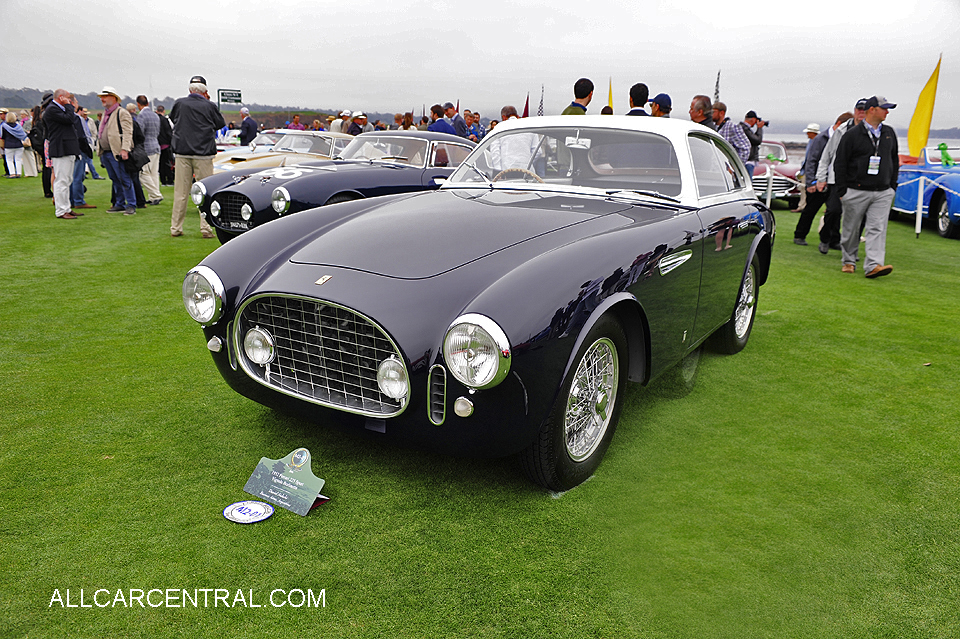
Ferrari 225 Sport
Vignale Berlinetta sn-0178ED 1952
By 1951 Carrozzeria Vignale was the main supplier of competition
bodywork for both Ferrari factory racers and privateers. The 1952
Mille Miglia had 27 Ferrari entries—a sixth of the total Ferrari
production to that date—and a Ferrari 250 S Vignale Berlinetta
came first overall, driven by Giovanni Bracco and Alfonso Rolfo.
This Ferrari 225 Sport (chassis 0178ED) was finished in May 1952
for Count Antonio Sterzi, who with Giulio Rovelli drove it in that
year’s Mille Miglia. Later that year, Sterzi was victorious at the Coppa
InterEuropa at Monza and the Coppa della Toscana. After the car was
Ferrari grand touring M-1
exported in the late 1950s, the body was somehow separated from
the engine, but both survived and now, after many years, chassis
0178ED has been reunited with its original engine, and it has been
fully restored by Ferrari Classiche.
Source: Pebble Beach Concours media release.

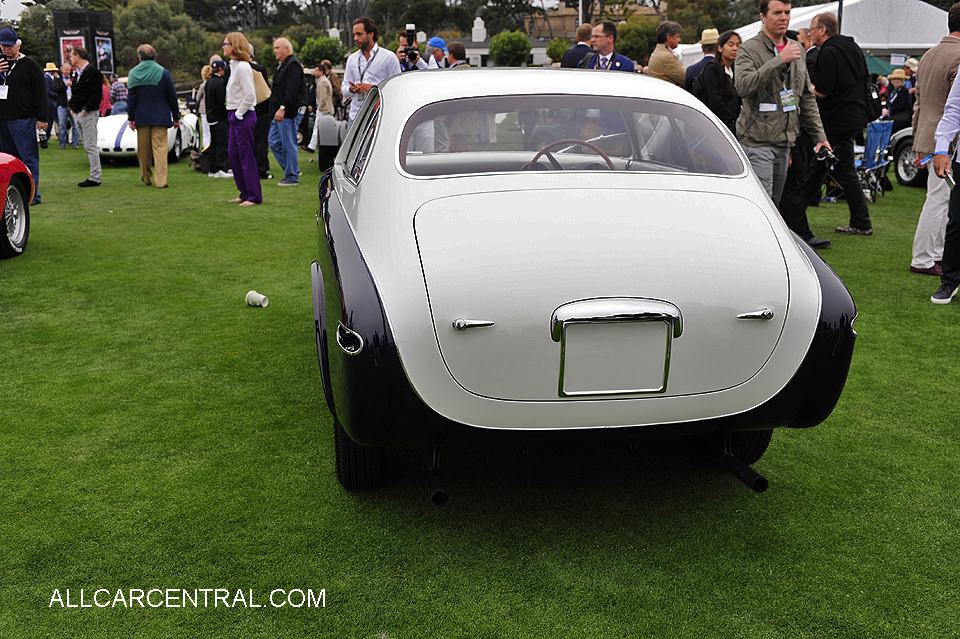
Ferrari 225 Sport Vignale Berlinetta sn-0178ED 1952

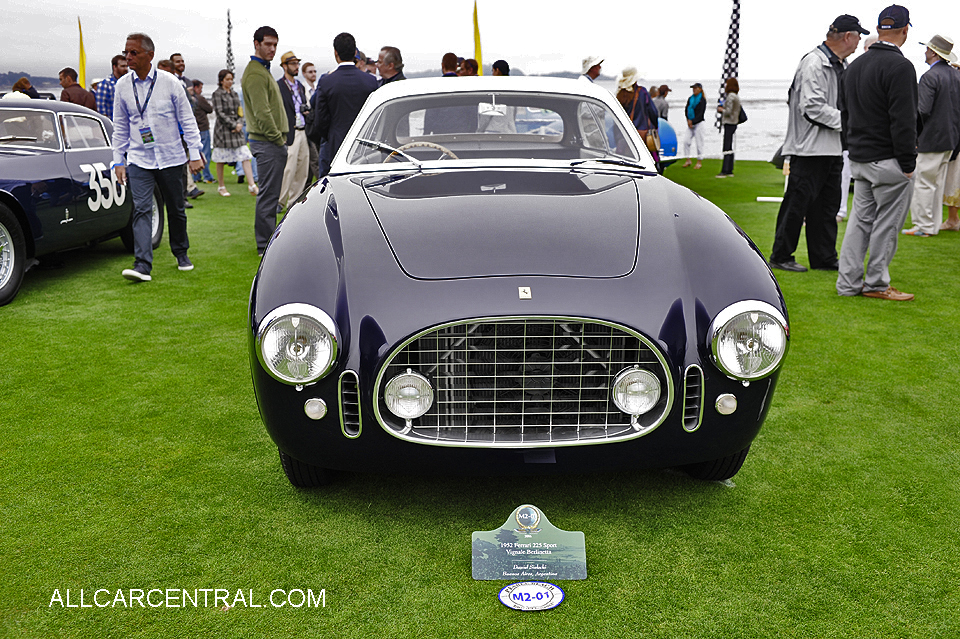
Ferrari 225 Sport Vignale Berlinetta sn-0178ED 1952

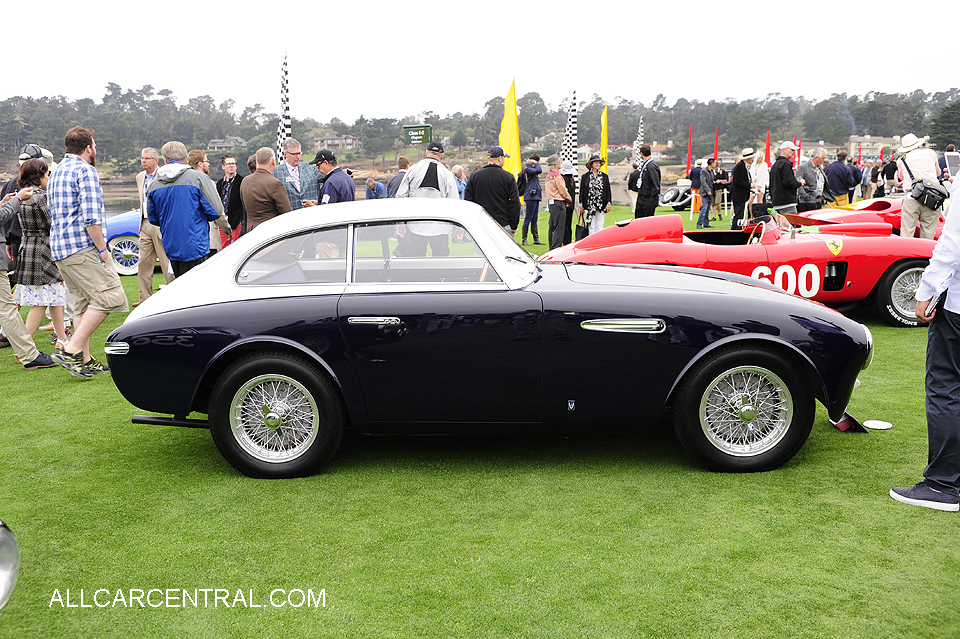
Ferrari 225 Sport Vignale Berlinetta sn-0178ED 1952

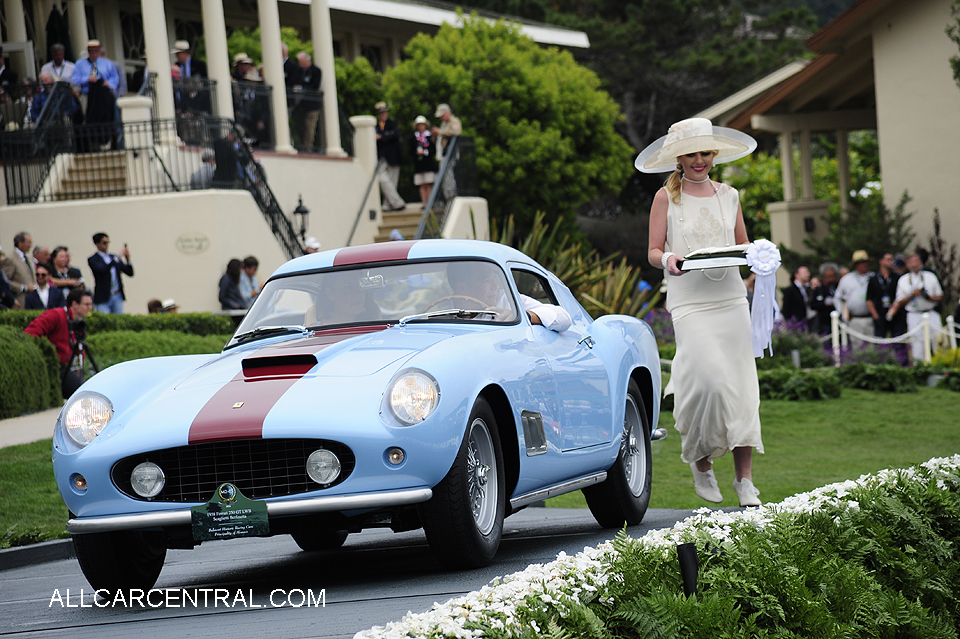
Ferrari 250 GT LWB
Scaglietti Berlinetta sn-1031GT 1958
In 1954 Ferrari began work on a new long wheelbase 250 GT
berlinetta that would become known as the Tour de France. The
Pinin Farina–bodied prototype, with multiple louvers in the rear
side panel, was shown at the Paris Auto Salon in 1955 and five more
series of 250 GT berlinettas followed. The Series II cars had three
louvers and covered headlights and the Series III had only a single
vent louver. This Series III car (chassis 1031GT) was built for privateer
racer Jacques Peron, and included a long-range fuel tank, Bendix
fuel pump, Speed-Pilot, and ammeter for its first race, the 1958 Tour
de France, where it finished 4th overall. After a small accident the car
was repaired by the Ferrari factory and sold to M. Cotton of Paris,
who raced it in the 1959 Tour de France before selling it in 1960. It
was acquired by its current owner in 2014, who commissioned a full
restoration.
Source: Pebble Beach Concours media release.

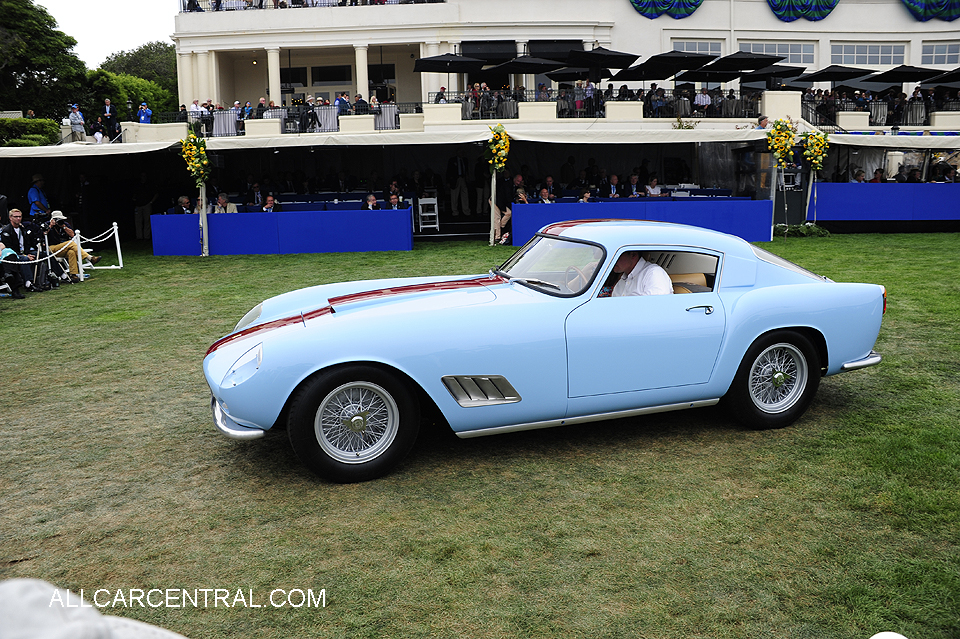
Ferrari 250 GT LWB Scaglietti Berlinetta sn-1031GT 1958

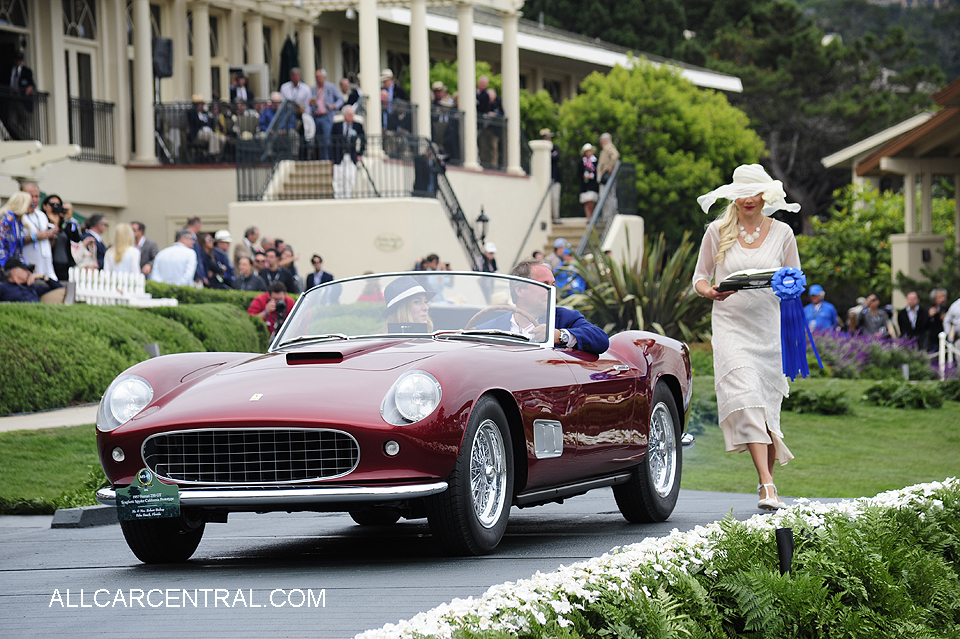
Ferrari
250 GT Scaglietti Spyder California
Prototype sn-0769GT 1957
This Ferrari (chassis 0769 GT) is the 250 GT Spyder California prototype. After Ferrari replaced its 250 Cabriolet Series I with the more
luxurious Series II, Ferrari’s two American distributors, Luigi Chinetti
and John von Neumann, convinced Enzo Ferrari to build a more
sporting version specifically for the American market—and the
Spyder California was the result. Based on the long wheelbase
250 GT Berlinetta, it has the 3.0-litre Tipo 128C V12 engine with an
unusual reverse-pattern gearbox. The finished chassis was delivered
to Carrozzeria Scaglietti in Modena who built the Pinin Farina–styled
body, and the car was finished in the summer of 1957. It was then
delivered to Chinetti, who sold it to his first business partner, George
Arents, in January 1958. It then passed through several other owners,
and the current owner bought the car in 2012.
Source: Pebble Beach Concours media release.

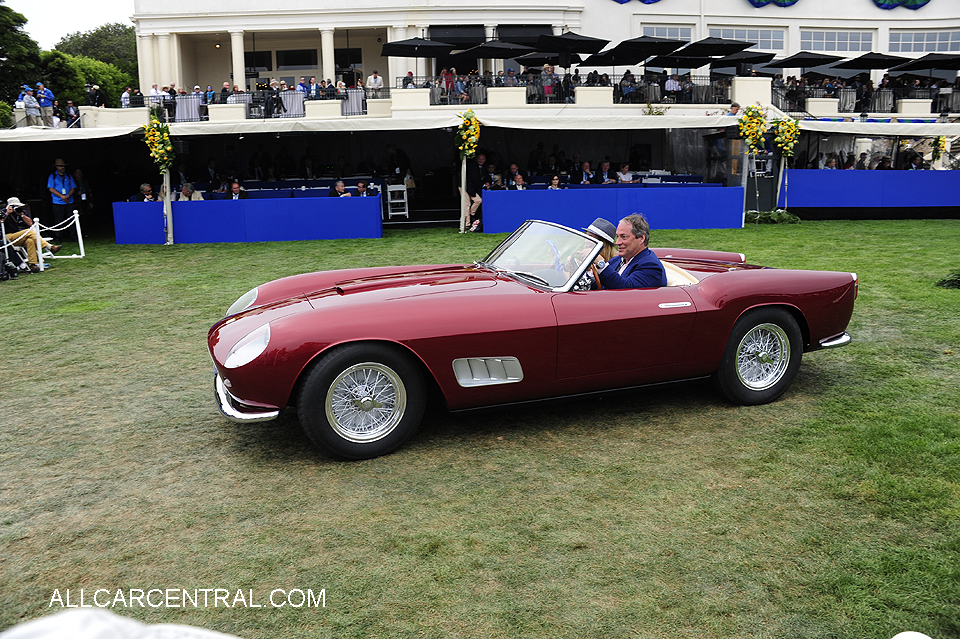
Ferrari 250 GT Scaglietti Spyder California Prototype sn- 0769GT 1957

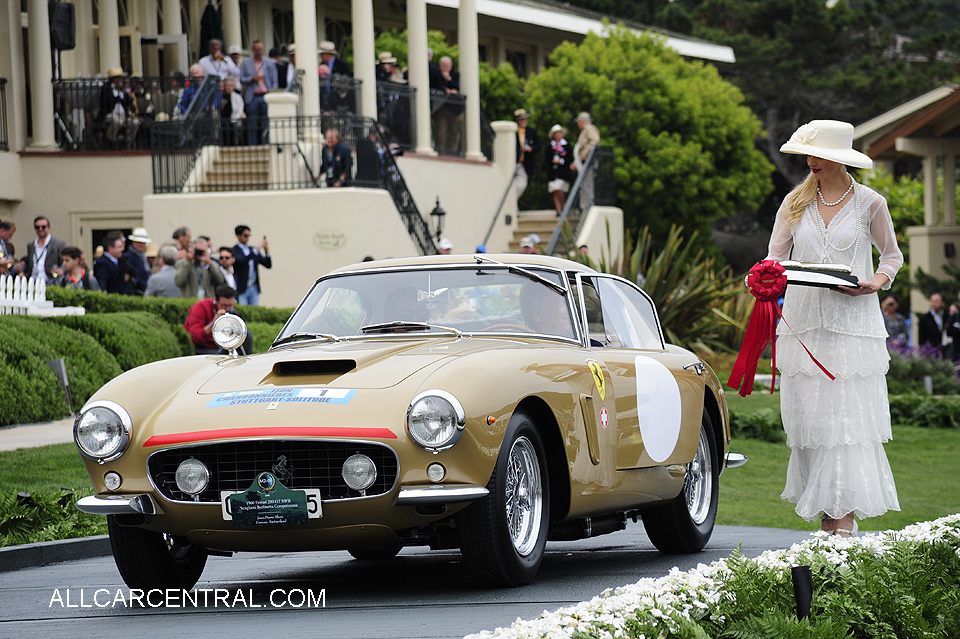
Ferrari 250 GT
SWB Scaglietti Berlinetta Competizione sn-2159GT
1960
Ferrari introduced a new alloy-bodied 250 GT short wheelbase
racing Berlinetta, based on its Tour de France–winning 250 GT long
wheelbase car, at the 1959 Paris Auto Salon. Developed by Giotto
Bizzarrini, Carlo Chiti, and Mauro Forghieri, 165 examples were
built by Carrozzeria Scaglietti, using aluminum for the racing cars
and steel for the road-going version. This alloy-bodied car (chassis
2159GT), the 44th Ferrari 250 GT SWB, was delivered to its first owner,
Gerard Spinedi in Geneva, towards the end of 1960. It won its first
race, the Rallye Lyon-Charbonnières, driven by Jo Schlesser, and
between 1961 and 1964, the gold-painted car was raced all over
Europe by Spinedi, often winning its class, and completing three
Tour de France rallies. After retiring from racing, the car was kept
in several private collections before being acquired by its current
owner in 2012.
Source: Pebble Beach Concours media release.

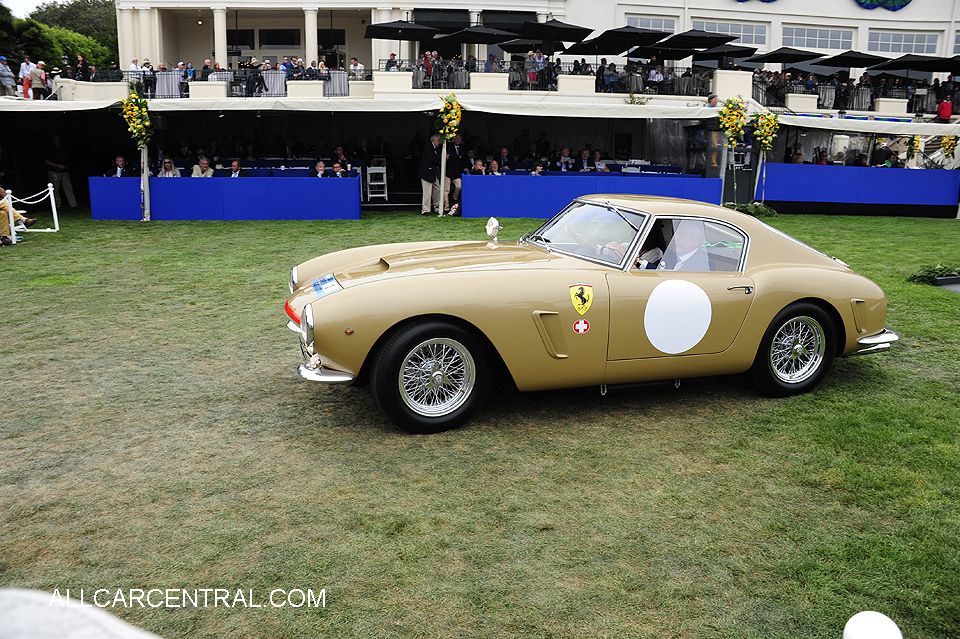
Ferrari 250 GT SWB Scaglietti Berlinetta Competizione 1960

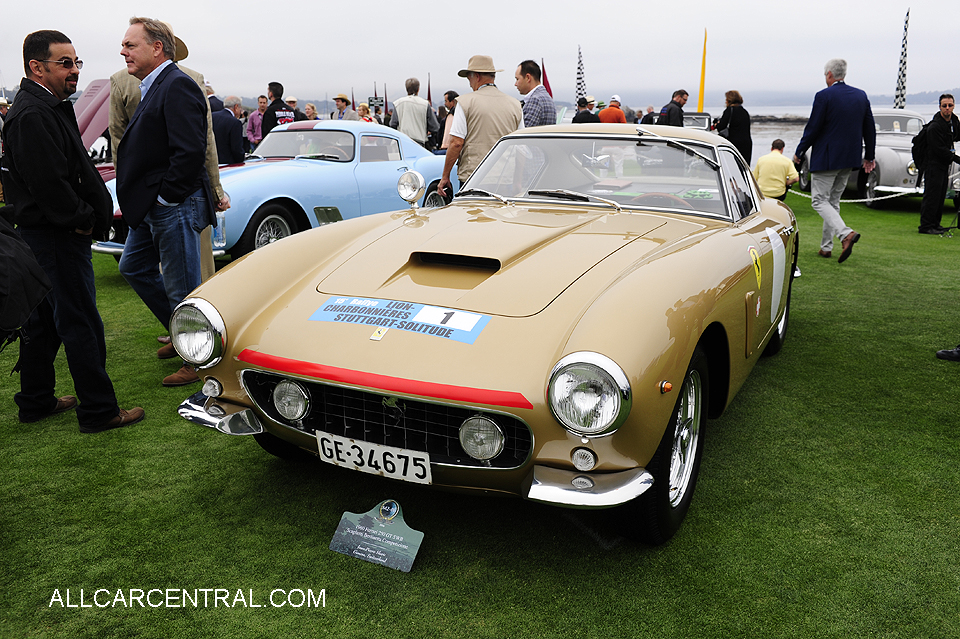
Ferrari 250 GT SWB Scaglietti Berlinetta Competizione sn-2159GT 1960 PB

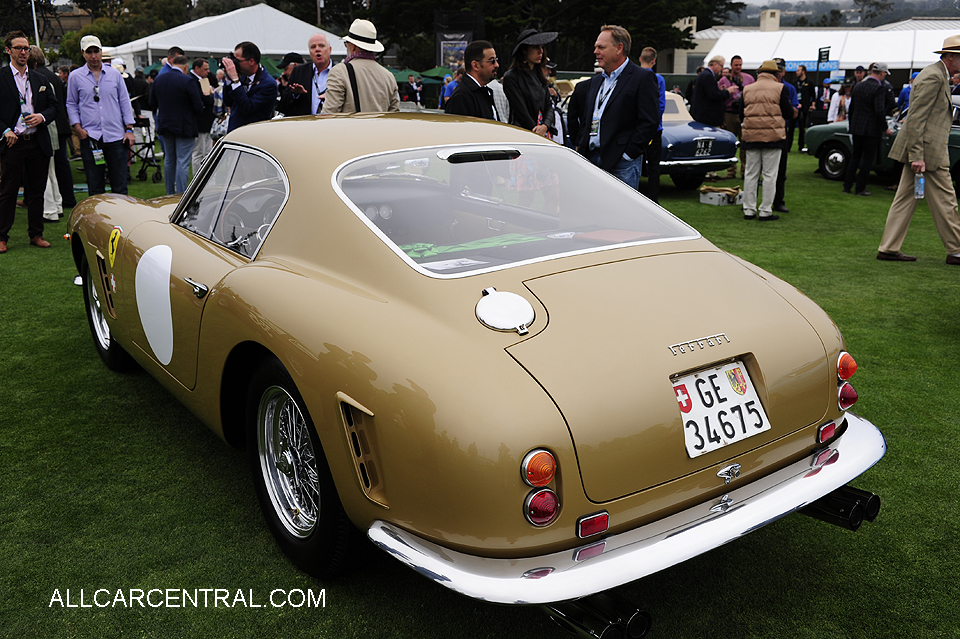
Ferrari 250 GT SWB Scaglietti Berlinetta Competizione sn-2159GT 1960 PB

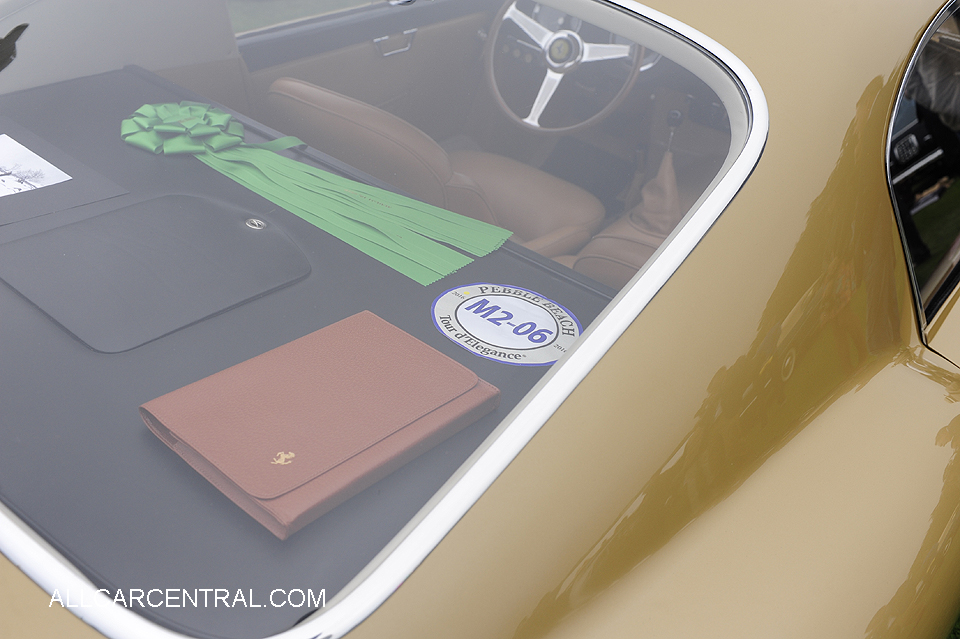
Ferrari 250 GT SWB Scaglietti Berlinetta Competizione sn-2159GT 1960 PB

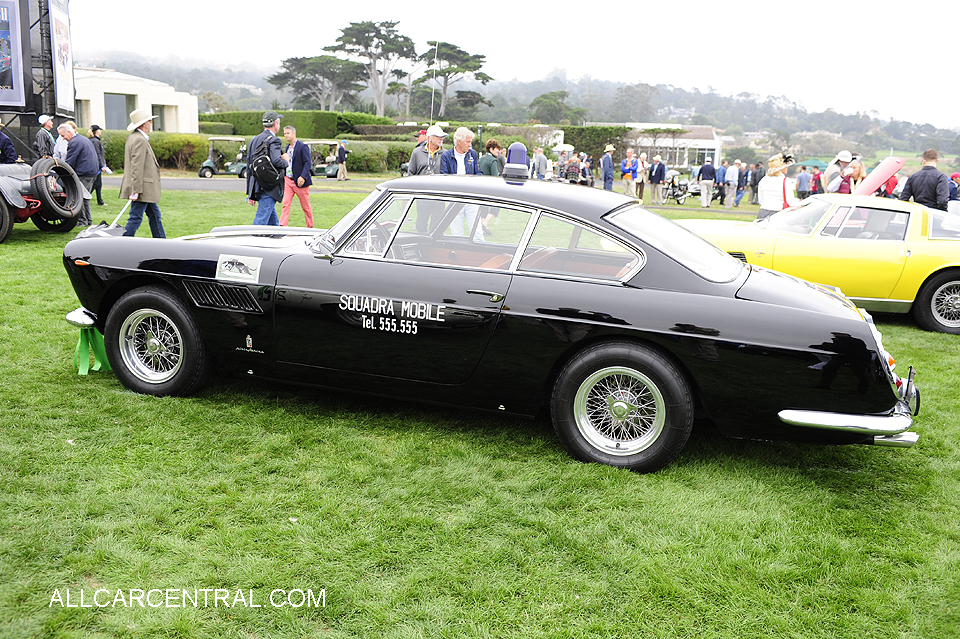
Ferrari 250
GTE Pininfarina Coupe sn-3999 GT 1962
The Ferrari 250 GTE made its public debut as an official track car at
Le Mans in 1960 but Enzo Ferrari officially unveiled his new model at
the Paris Auto Salon later that year. The new Ferrari was more
luxurious than other Ferraris, with the best-quality leather interior
and a large backseat to fit two adults—or, as in this example, possibly
even criminals! In 1962, the Italian police were asked by the President
of the Italian Republic what they wanted as a reward for their efforts
to get organized crime under control. They replied, almost as a joke,
“How about a Ferrari?” Incredibly, they got what they wished for;
police in the city of Rome were given two special 3-liter, V12-engined
Ferrari 250 GTE coupes—each equipped with blue flashing lights.
One was destroyed in an accident during testing, but this 250 GTE
(chassis 3999 GT) patrolled the city streets for several years, taking
part in many legendary police chases and becoming a part of
Roman lore.
Source: Pebble Beach Concours media release.

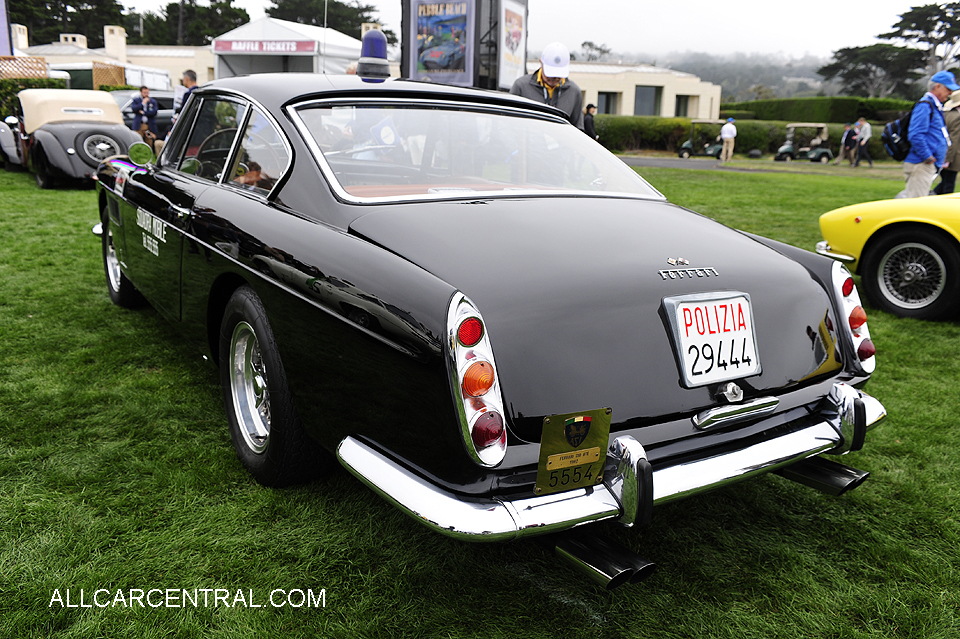
Ferrari 250 GTE Pininfarina Coupe sn-3999 GT 1962 L205 PB

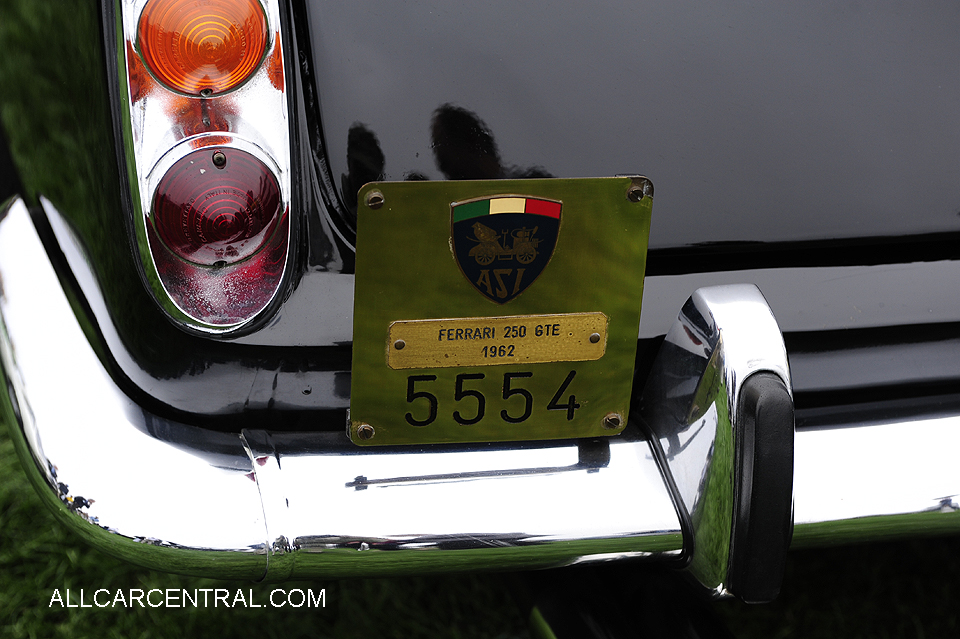
Ferrari 250 GTE Pininfarina Coupe sn-3999 GT 1962 L205 PB

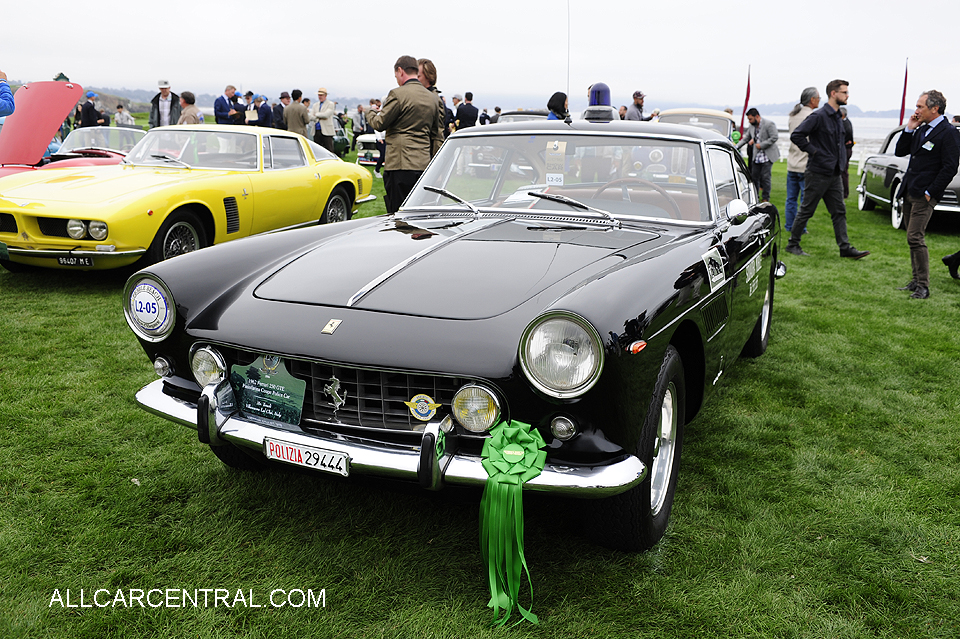
Ferrari 250 GTE Pininfarina Coupe sn-3999 GT 1962 L205 PB

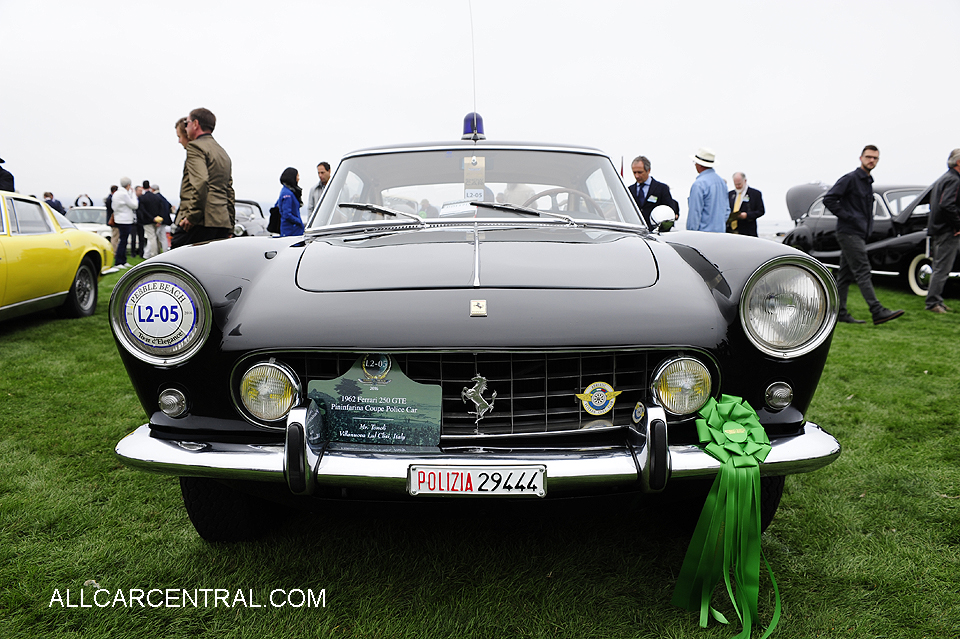
Ferrari 250 GTE Pininfarina Coupe sn-3999 GT 1962 L205 PB

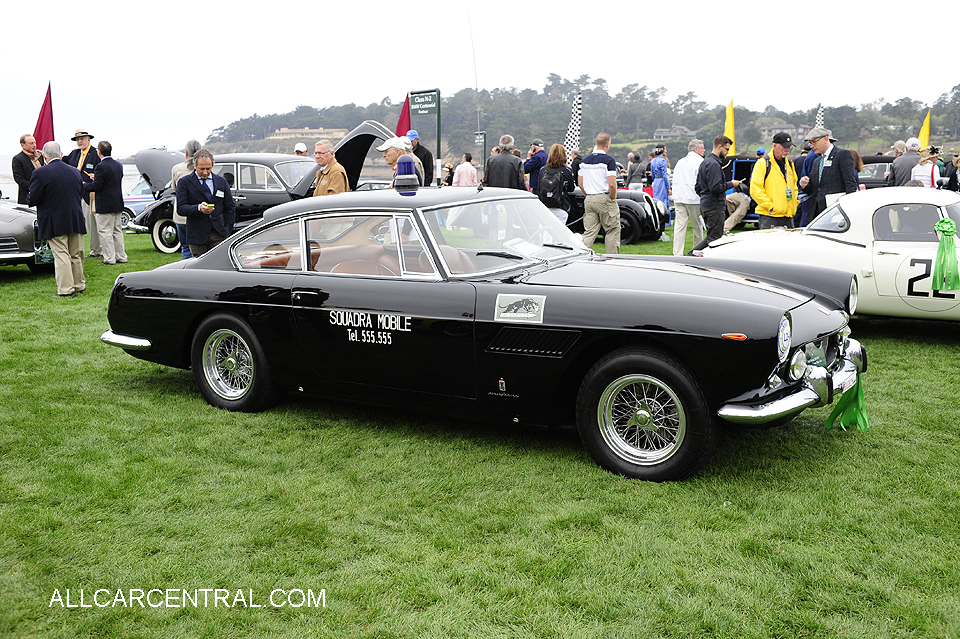
Ferrari 250 GTE Pininfarina Coupe sn-3999 GT 1962 L205 PB

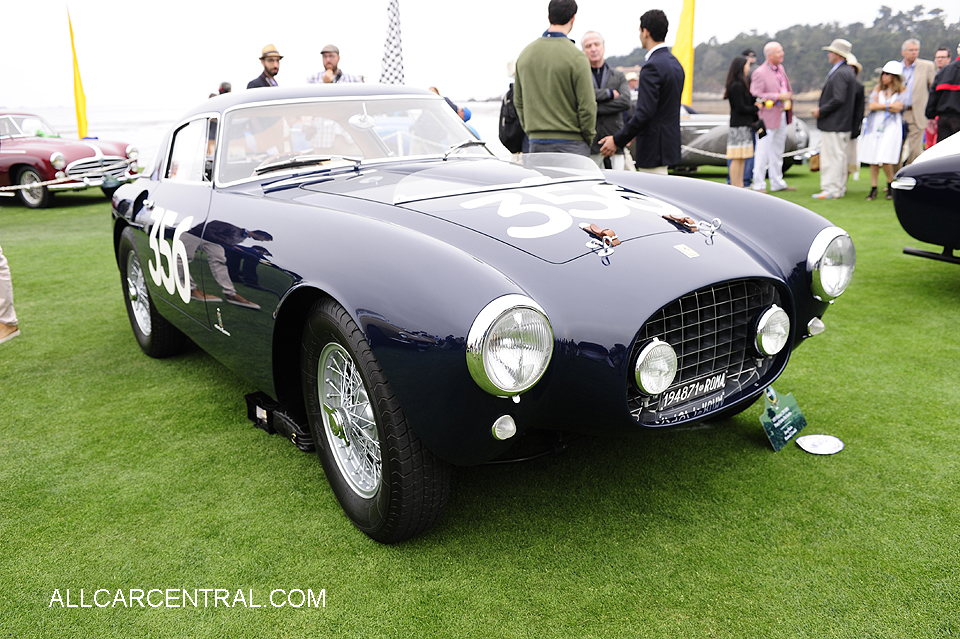
Ferrari 250 MM Pinin
Farina Berlinetta sn-0340MM 1953 PB
The first Ferrari 250 MM prototype, which was derived from the 250 S
that had just won the Mille Miglia, was displayed at the Paris Auto
Salon in 1952. A Total of 31 Ferrari 250 MM chassis were produced,
and 18 Berlinettas were built by Pinin Farina for the 1953 racing
season. The first of these was shown at the 1953 Geneva Auto Show,
and the first 250 MM made its racing debut at the 1953 Giro di Sicilia
driven by Paolo Marzotto. This car (chassis 0340MM) made its racing
debut at the 1954 Giro di Sicilia, finishing 7th overall, then went on to
race in that year’s Mille Miglia, and continued racing in Italy through
1955. It was brought to the United States by Roger Ellis in 1964. Its
current owner restored the car last year.
Source: Pebble Beach Concours media release.

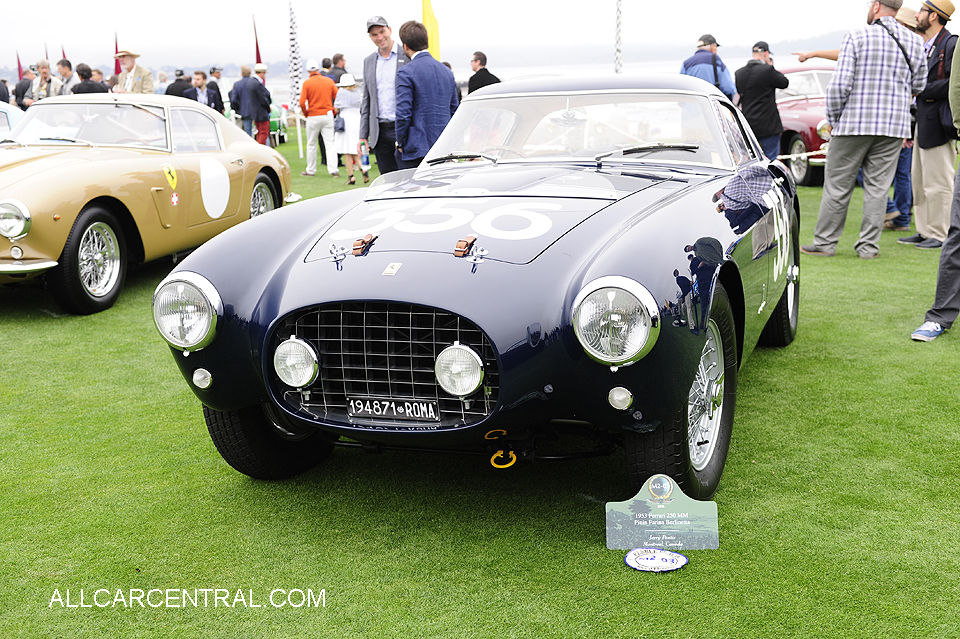
Ferrari 250 MM Pinin Farina Berlinetta sn-0340MM 1953

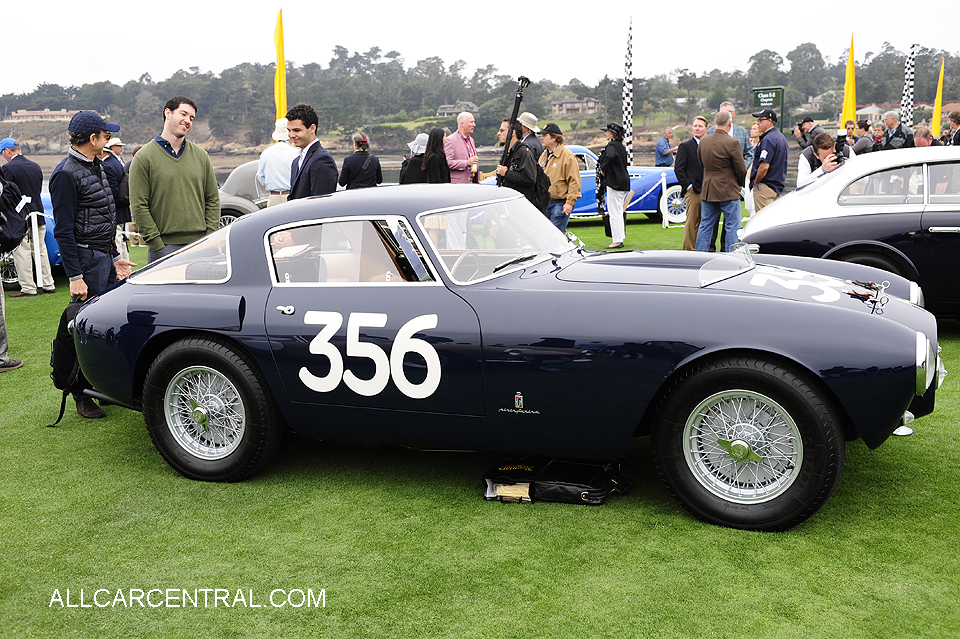
Ferrari 250 MM Pinin Farina Berlinetta sn-0340MM 1953

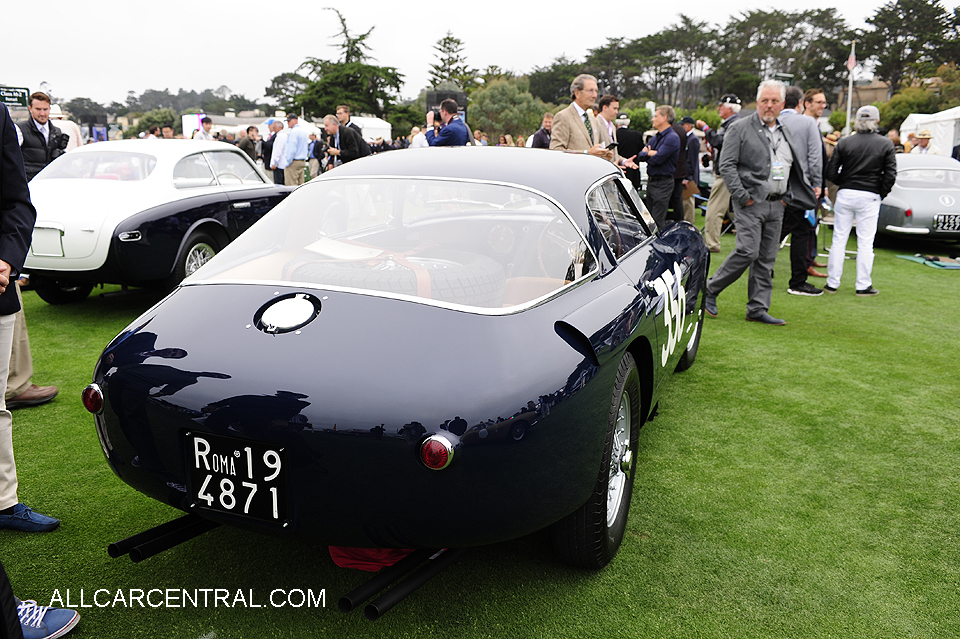
Ferrari 250 MM Pinin Farina Berlinetta sn-0340MM 1953

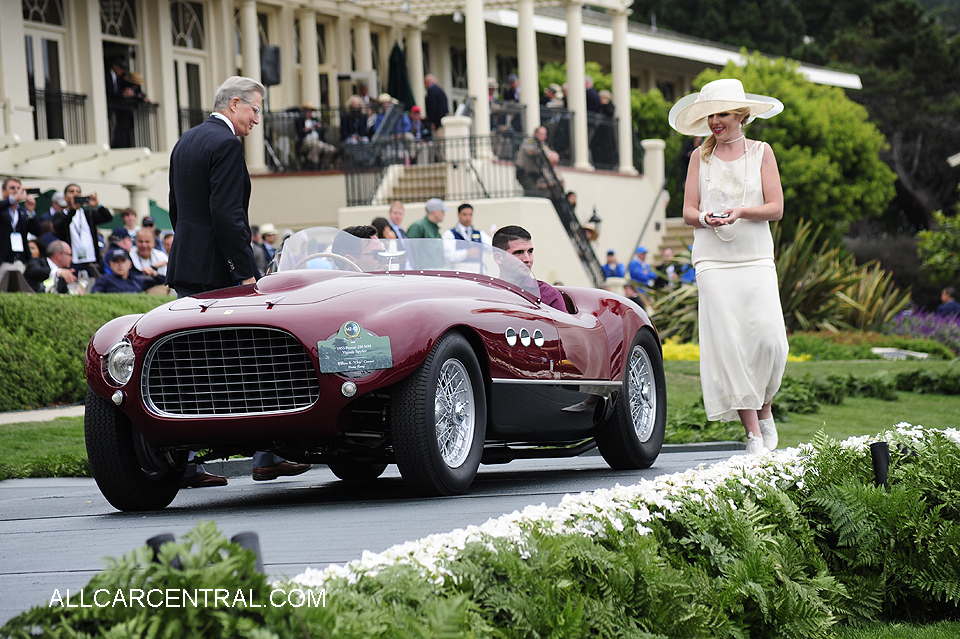
Ferrari 250 MM Vignale Spyder
sn-0326 MM 1953
Ferrari 250 MM Vignale Spyder (chassis 0326 MM) is the 19th of the
250 MMs built and one of 12 Spyders built by Vignale. The car was
sold to the Portuguese amateur driver, Fernando de Mascarenhas,
the Marquis of Fronteira, who entered it in numerous races in
Portugal and Brazil, where it enjoyed a successful career between
March 1953 and the end of 1954. The car’s second owner, Antonio
Borges Barreto, continued to race the car successfully during 1955.
For the next 40 years the car was owned by collectors in Italy,
Germany, and Switzerland and it took part in several Mille Miglia
Storica retrospectives. Its current owner, Chip Connor, and his
co-driver extraordinaire, Bruce Meyer, entered it in the 1997 Mille
Miglia Storica.
Source: Pebble Beach Concours media release.

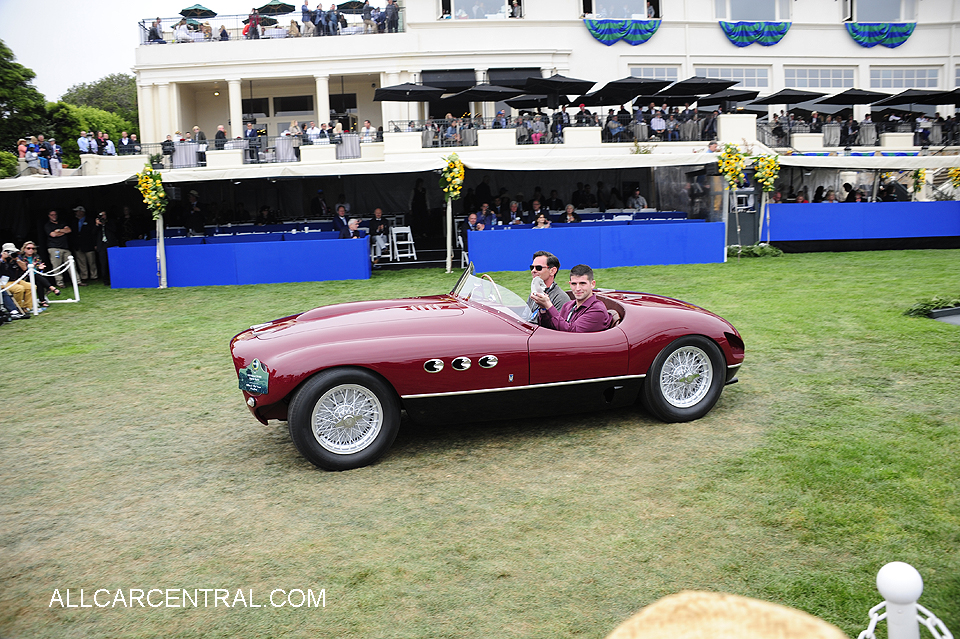
Ferrari 250 MM Vignale Spyder sn-0326 MM 1953

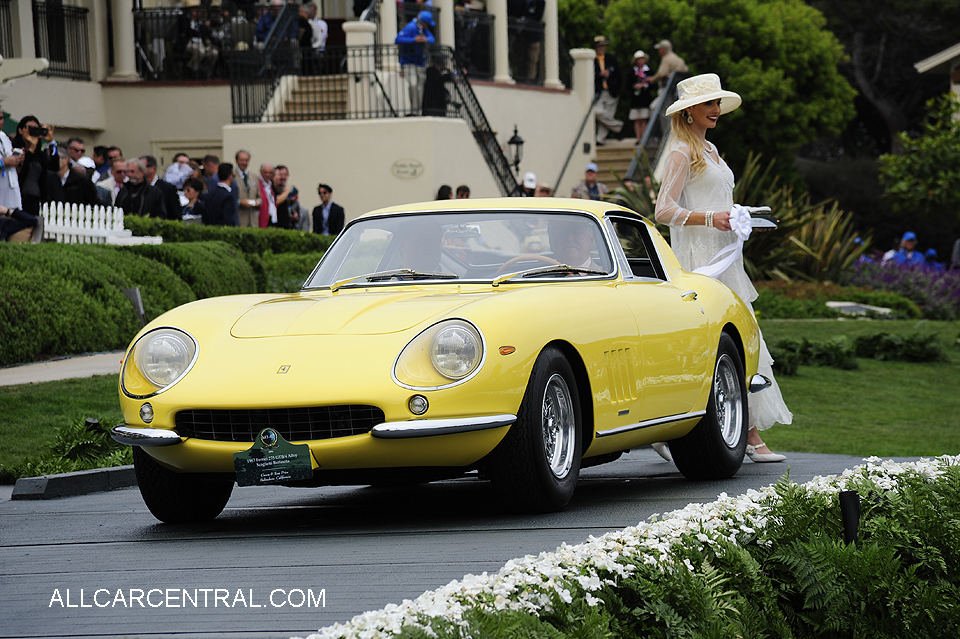
Ferrari
275 GTB-4 Alloy Scaglietti Berlinetta
sn-9609 1967
The V12-engined 275 GT Berlinetta was introduced at the Paris Auto
Salon in 1964 and was followed by the more powerful GTB/4 with
additional twin camshafts and six twin-choke Weber carburetors.
This is one of 16 alloy-bodied 275 GTB/4s with coachwork designed
by Pininfarina and built by Scaglietti. The 275 GTB/4 was the last
of the great front-engined Ferrari GTs, and it offers one of the
most rewarding driving experiences of all the road-going Ferrari
sports cars. This car (chassis 9609) was enjoyed by several owners
on the East Coast before it headed West in 2003. Its current owner
commissioned a complete restoration and engine rebuild in 2007
and has since won several concours awards.
Source: Pebble Beach Concours media release.

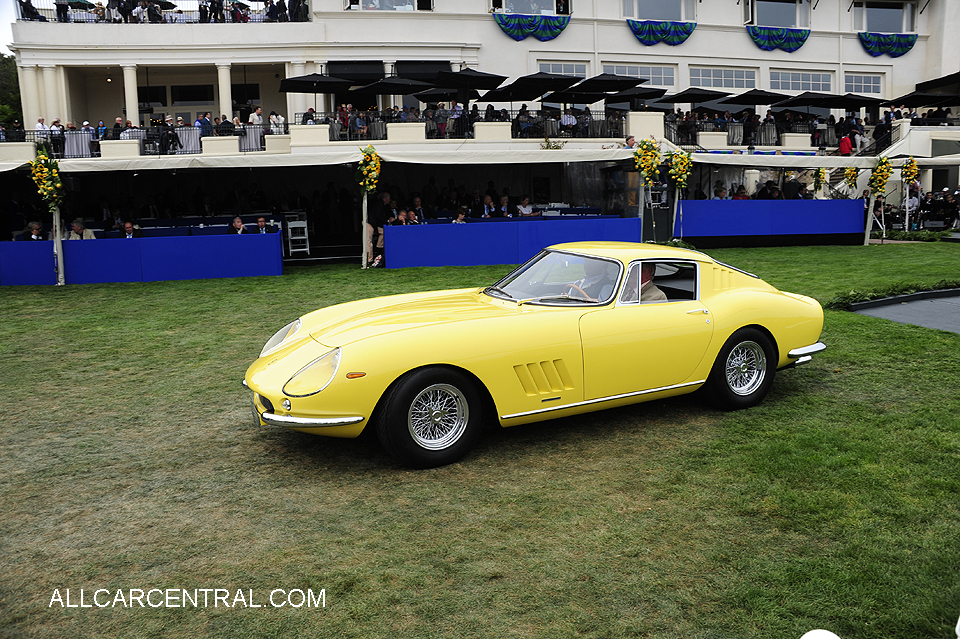
Ferrari 275 GTB-4 Alloy Scaglietti Berlinetta sn-9609 1967

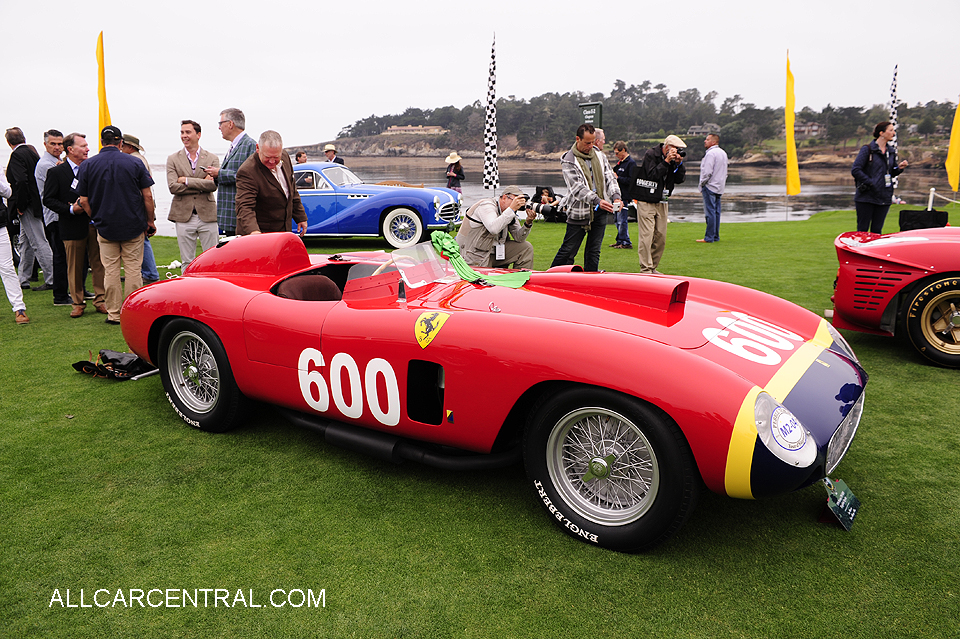
Ferrari 290 MM Scaglietti
Spyder sn-0626 1956
After losing out to Mercedes-Benz in the 1955 World Sportscar
Championship, Ferrari recognized that it needed a more powerful car
for 1956 and, at the suggestion of engineer Vittorio Jano, returned
to its tried and trusted 320 bhp, 3,490 cc V12 engine to power his
new sports cars. Driving solo, Juan Manuel Fangio piloted this car
(chassis 0626) to 4th place in the 1956 Mille Miglia, one of the wettest
on record. Then Phil Hill, Ken Wharton, Olivier Gendebien, and the
Marquis de Portago took 3rd overall in the Nürburgring 1000 km.
When Wolfgang (Taffy) von Trips and Peter Collins finished 2nd with it
at the 1956 Swedish GP at Kristianstad, the Championship was back
with Ferrari. In the spring of 1957, the car was sold to American team
owner Temple Buell, and it was raced until 1964 by Masten Gregory,
Jo Bonnier, Paul O’Shea, and Manfredo Lippman. The car was never
crashed and is one of the most valuable cars in the world.
Source: Pebble Beach Concours media release.

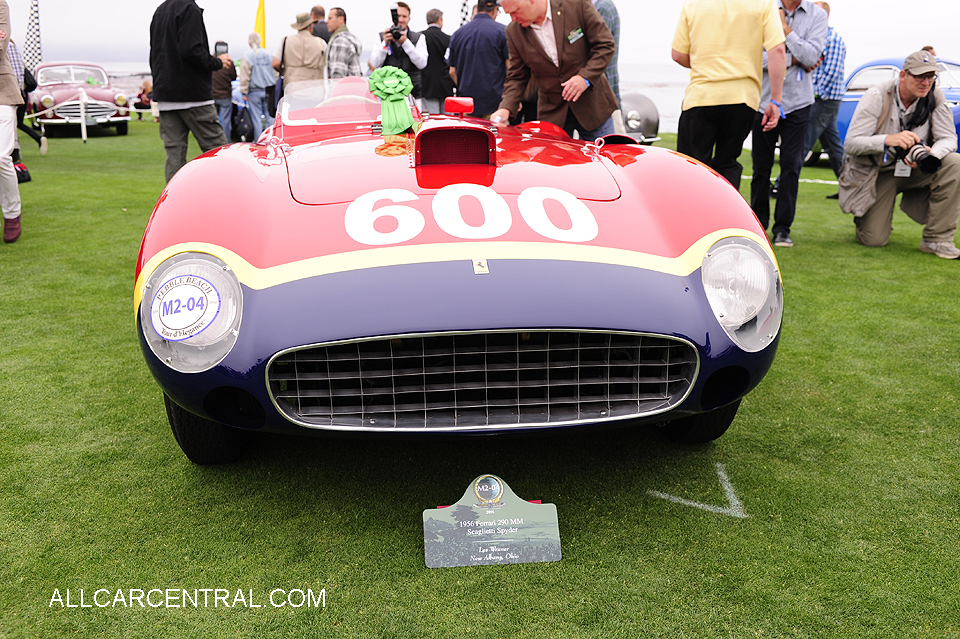
Ferrari 290 MM Scaglietti Spyder sn-0626 1956 PB

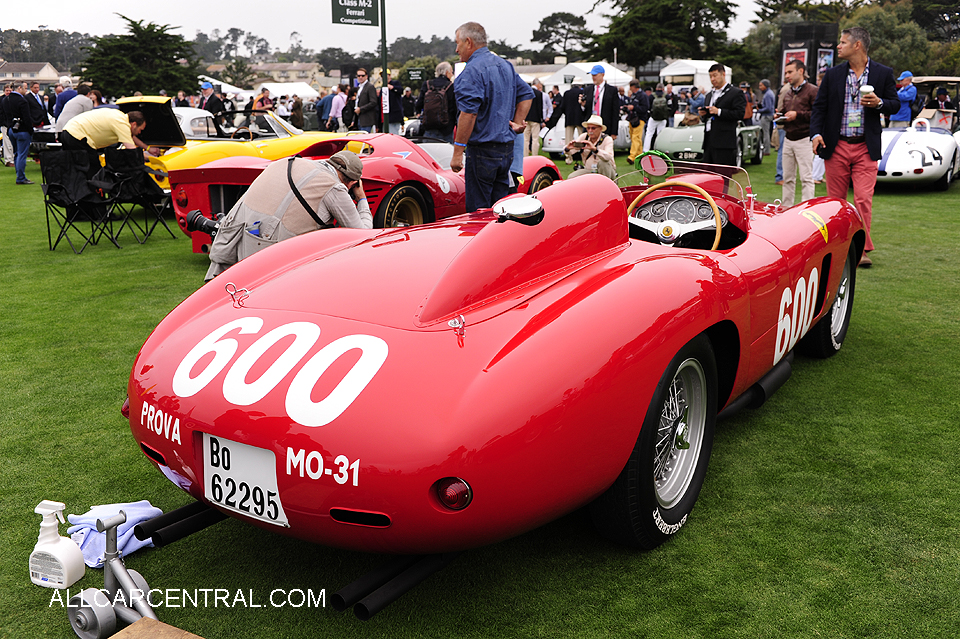
Ferrari 290 MM Scaglietti Spyder sn-0626 1956 PB

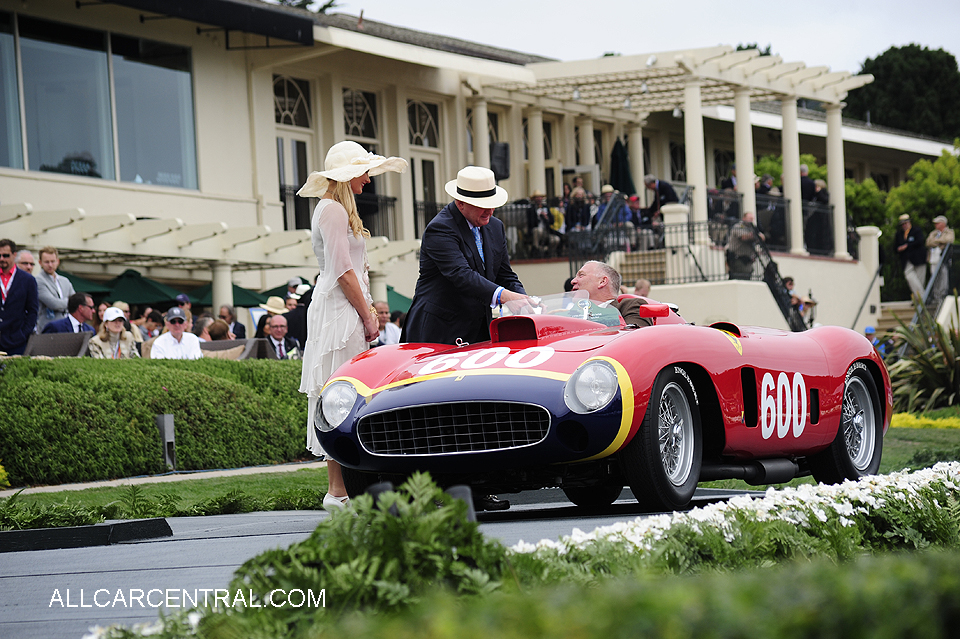
Ferrari 290 MM Scaglietti Spyder sn-0626 1956

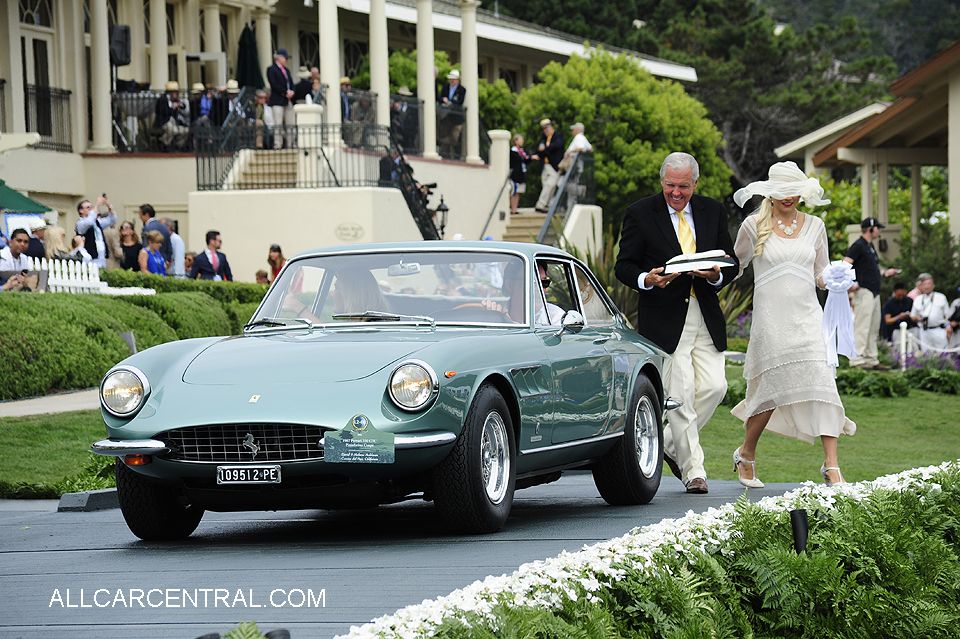
Ferrari 330 GTC
Pininfarina Coupe 1967
The Ferrari 330 GTC was introduced two years after the 330 GT 2+2
as a cross between the luxurious 330 GT 2+2 and the more sporting
275 GTB. The 330 GTC used the same steering, suspension and
transmission as the 275 GTB, but had a wheelbase 10 inches shorter
than the earlier 330 GT 2+2. The engine is the Colombo-designed
V12, which produced 300 horsepower, a top speed of 150 mph,
and a zero to 60 mph time of just under 7 seconds. This particular
example was first presented by Ferrari at the 1967 Turin Motor
Show. It was the only 330 GTC ever built in Verde Medio green paint
with Rosso red leather interior—one of the most interesting color
combinations seen on any Ferrari.
Source: Pebble Beach Concours media release.

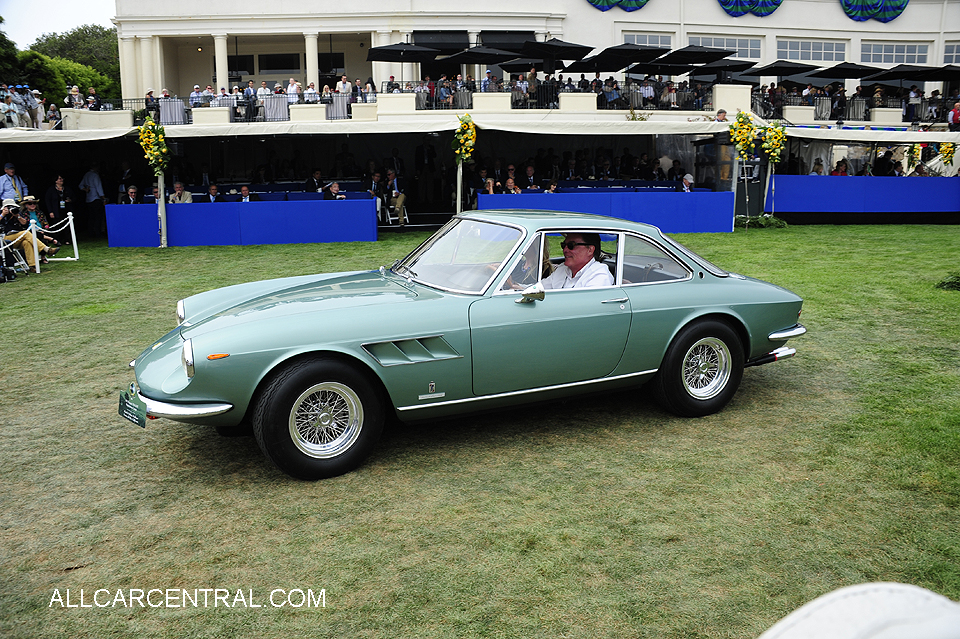
Ferrari 330 GTC Pininfarina Coupe 1967

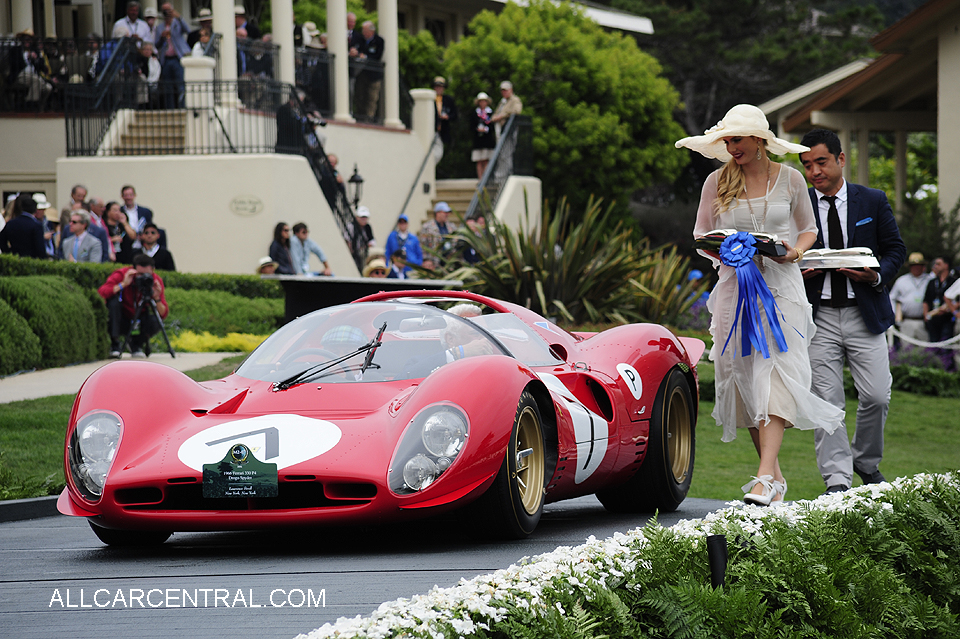
Ferrari 330 P4 Drogo Spyder
sn-0856 1966
This Ferrari 330 P4 (chassis 0856) is the only original example of the
three P4s built for the 1967 race season. The aerodynamic, midengined racer was designed and built by Pierre Drogo and was further
updated by Ferrari before every race it entered. The P4’s 450 bhp
V12 engine was modeled on Ferrari’s Grand Prix–winning unit,
with Lucas fuel injection in place of carburetors. In its first race
at the 24 Hours of Daytona in February 1967, Ferrari stunned the
racing world when this car crossed the line in 2nd place, alongside the
other two P4s in 1st and 3rd for a photo finish to mirror the legendary
moment when the three Ford GT40s won Le Mans in 1966. The car
continued its success that year, winning the 1000 km race at Monza
driven by Lorenzo Bandini and Chris Amon, and finishing 3rd at Le Mans
48
driven by Willy Mairesse and Jean Blaton. Its last international race for
Ferrari was at the Brands Hatch BOAC 500 Mile that July after it had
been converted it to the open-roof configuration it has today.
Source: Pebble Beach Concours media release.

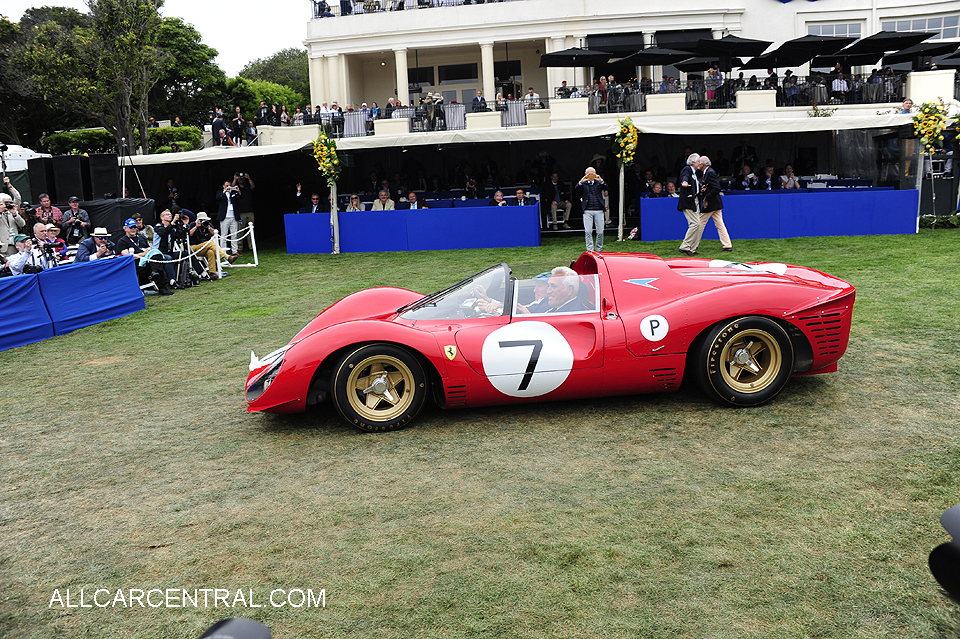
Ferrari 330 P4 Drogo Spyder sn-0856 1966

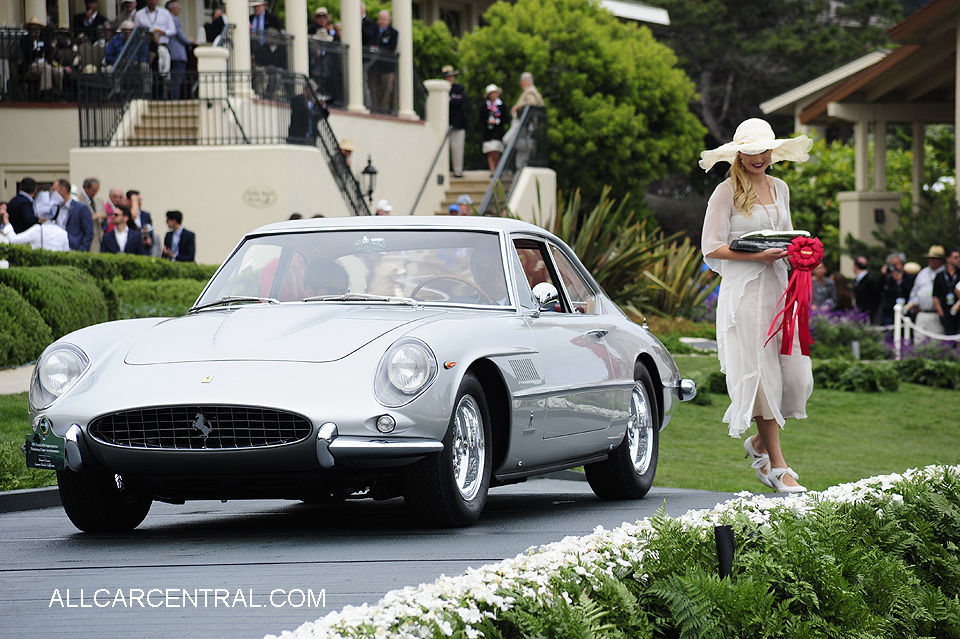
Ferrari 400 Superamerica Pininfarina
Coupe Aerodinamico sn- 5029 SA 1963
Ferrari’s Superamerica range was intended to appeal to wealthy
individuals for whom a regular Ferrari was just a little too ordinary.
The first Ferrari 410 Superamerica was built from 1956 to 1959, the
Ferrari 400 Superamerica Series I was introduced at the 1959 Turin
Motor Show, and the 400 Superamerica Series II debuted at the
London Motor Show in September 1962. The new car retained the
distinctive aerodynamic coachwork of the earlier cars but was built
on a longer 250 GTE chassis. The 400 Superamerica attracted many
well-heeled owners, including Gianni Agnelli, Count Volpi, and
Nelson Rockefeller. This example (chassis 5029 SA) is the 15th of the
18 long wheelbase cars that were constructed before production
came to a close in 1964.
Source: Pebble Beach Concours media release.

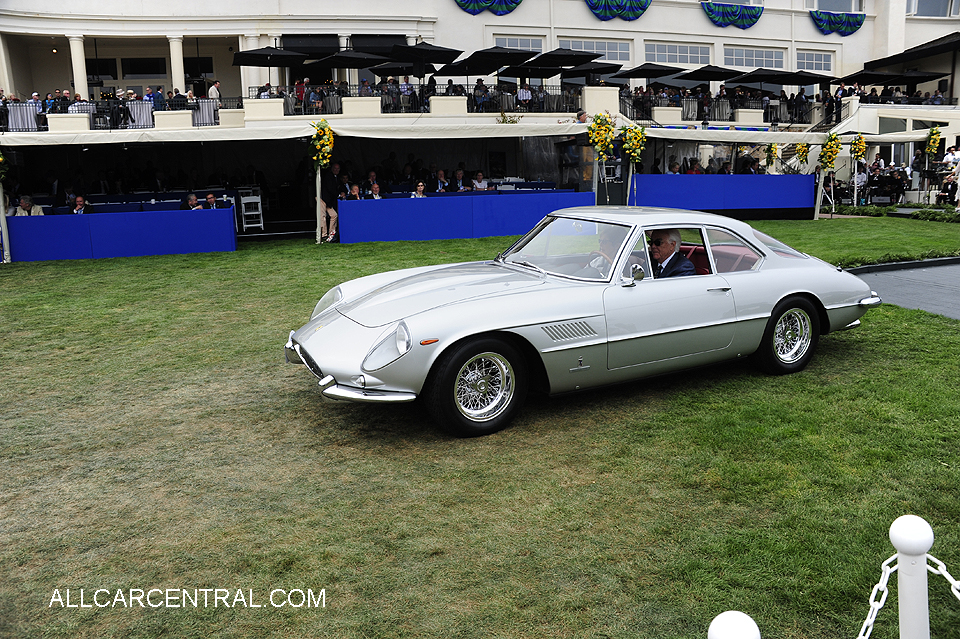
Ferrari 400 Superamerica Pininfarina Coupe Aerodinamico sn- 5029 SA 1963

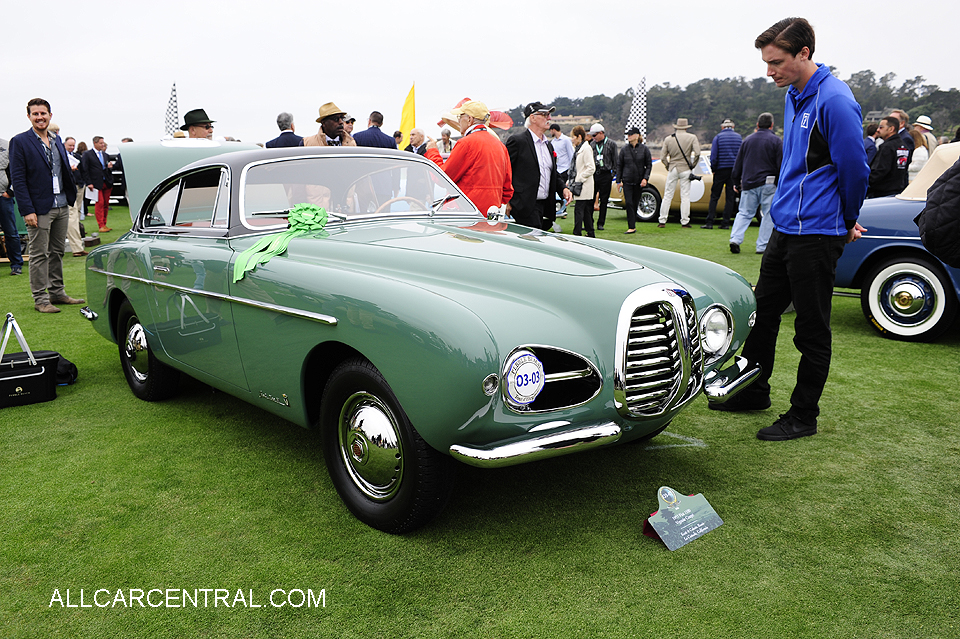
Fiat 1100 Vignale Coupe 1953
This car is one of two Fiat 1100s designed by Giovanni Michelotti and
built by Carrozzeria Vignale, and it was first shown at the 1953 Turin
Auto Show. Its first owner is not known, but by 1954, it was owned
by Harrison Godwin, a resident of Carmel, California. This Fiat 1100
Vignale was shown at the 1955 Pebble Beach Concours d’Elegance
and was featured in an article in the July 1956 issue of Motor Life
magazine. In the late 1960s Godwin drove it to Portland, Oregon,
but the Fiat developed an engine problem and it was left at a repair
shop where it remained for a number of years before being rescued
and taken to a new home. A restoration was planned but never took
place, and the forlorn but complete little Fiat was sold to the present
owner in 2008. He commissioned a thorough restoration, which was
completed last year, and today the car returns to Pebble Beach, 61
years after it was first seen here.
Source: Pebble Beach Concours media release.

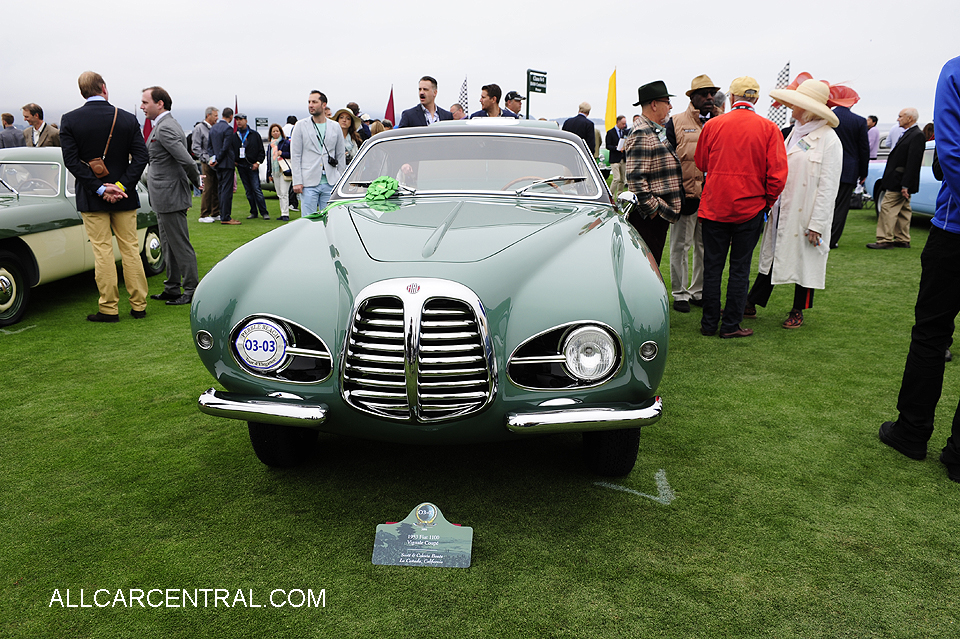
Fiat 1100 Vignale Coupe 1953

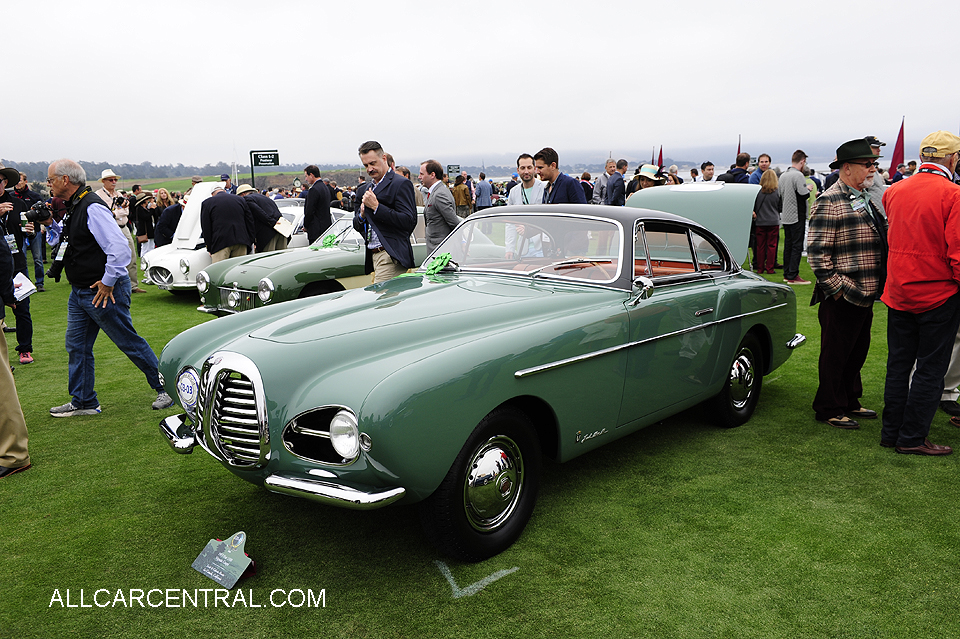
Fiat 1100 Vignale Coupe 1953

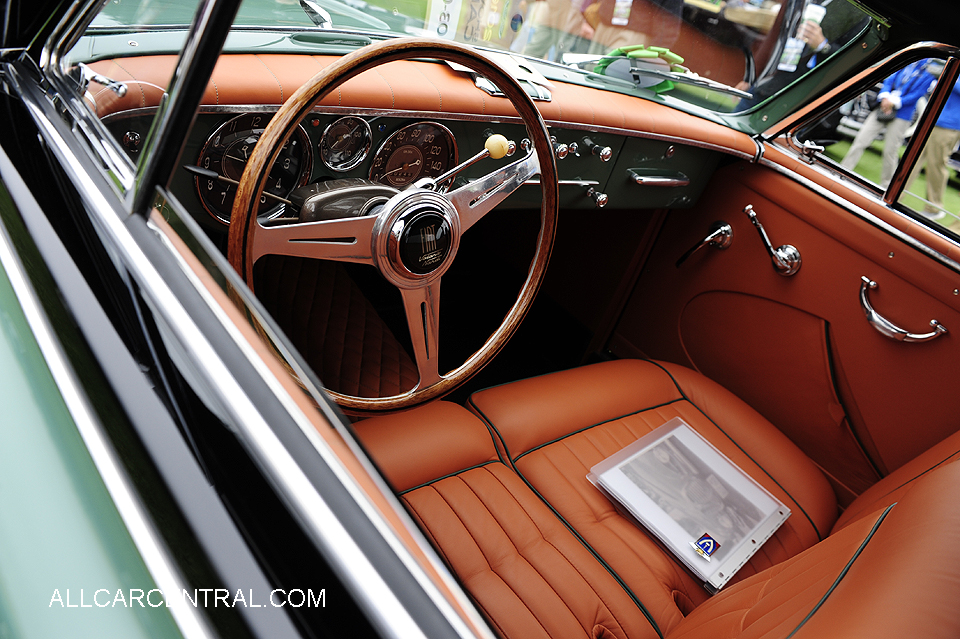
Fiat 1100 Vignale Coupe 1953

Fiat 1100E Zagato Berlinetta Strada e Corsa sn-1100 368374 1952 O301 PB 2016

Fiat 1100E Zagato Berlinetta Strada e Corsa sn-1100 368374 1952 O301 PB 2016

Fiat 1100E Zagato Berlinetta Strada e Corsa sn-1100 368374 1952 O301 PB 2016

Fiat 1100E Zagato Berlinetta Strada e Corsa sn-1100 368374 1952 O301 PB 2016

Fiat 1100E Zagato Berlinetta Strada e Corsa sn-1100 368374 1952 O301 PB 2016

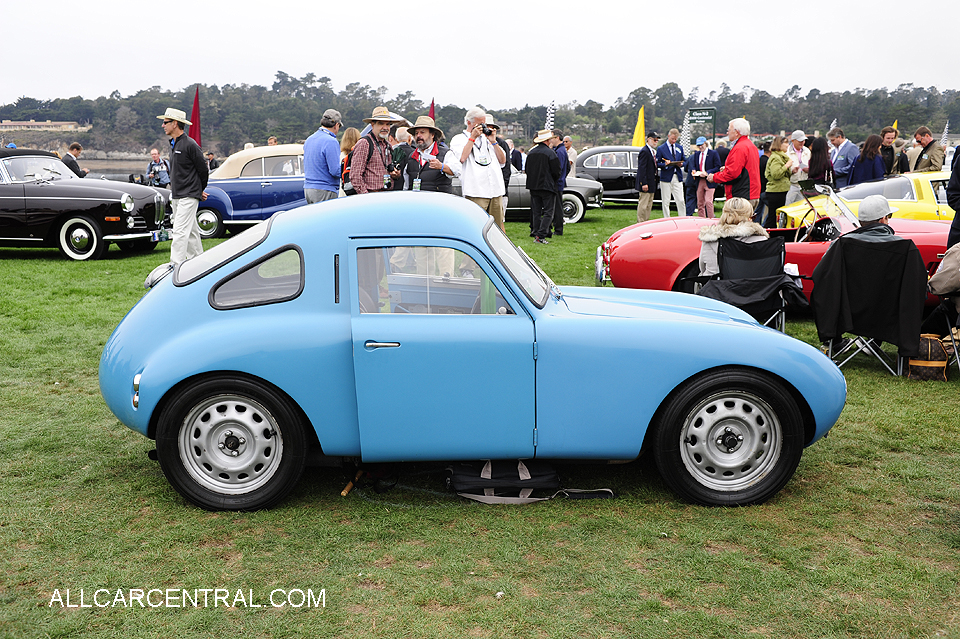
Fiat 500 Bizzarrini
Macchinetta Berlinetta 1953 R01 PB 2016
This is the first car to be built by Giotto Bizzarrini himself in 1953
while studying mechanical engineering at the University of Pisa.
This streamlined Berlinetta has a Fiat 500 Topolino chassis and
drivetrain with an aluminum body formed over a fragile steel
frame. Interestingly, although the engine has a slightly smaller
capacity than the standard Fiat 500 unit, Bizzarrini fitted a Siata
high-performance cylinder head with twin carburetors boosting
the performance to around 30 bhp—not too shabby for a small car.
The 500 Macchinetta served as Giotto Bizzarrini’s graduation thesis,
it was highly commended by his professors, and it kick-started his
career. After graduating, Bizzarrini drove his car to a job interview
at Ferrari and after seeing his Macchinetta, Enzo Ferrari hired him
on the spot.
Source: Pebble Beach Concours media release.

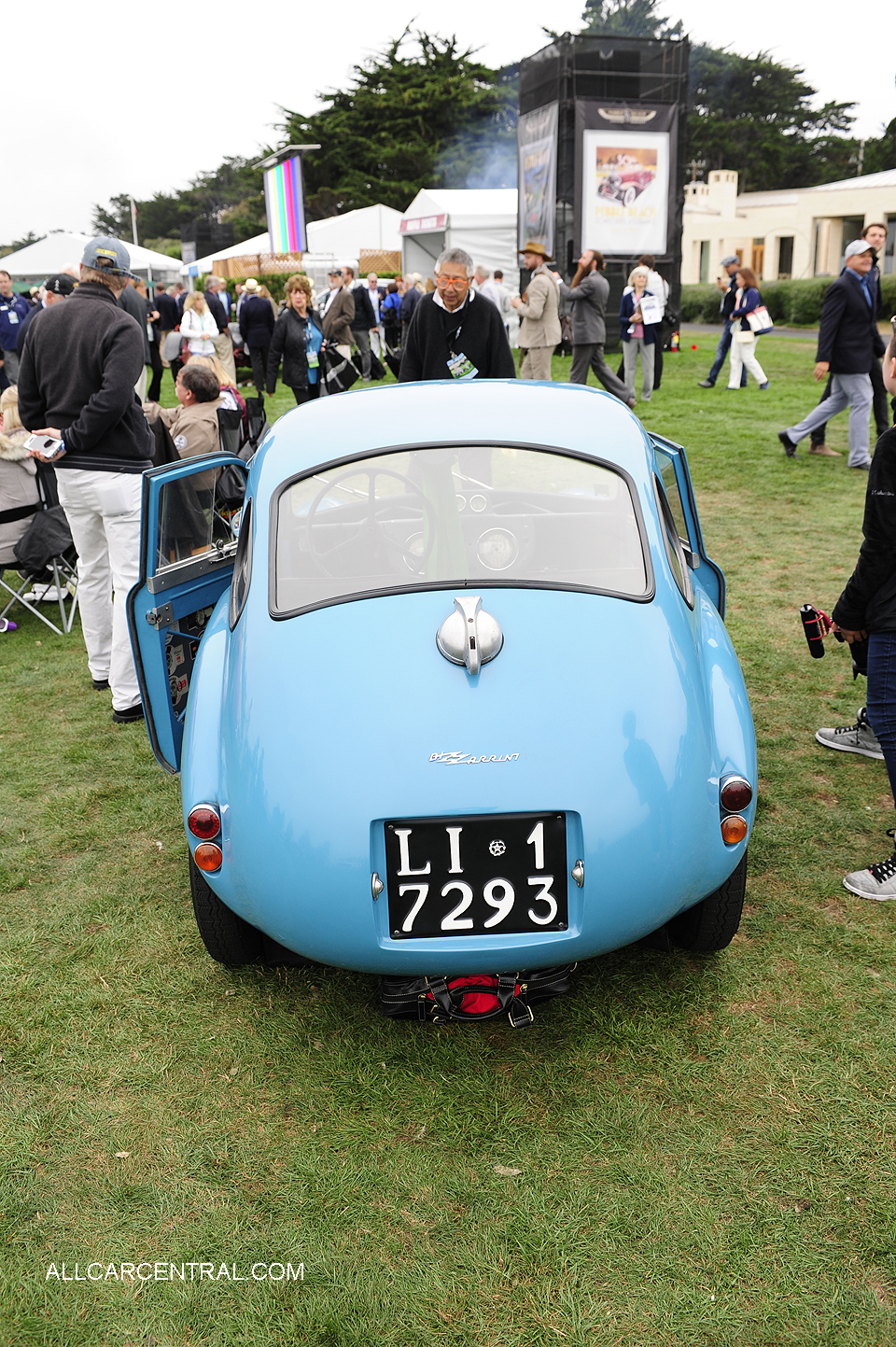
Fiat 500 Bizzarrini Macchinetta Berlinetta 1953 R01 PB 2016

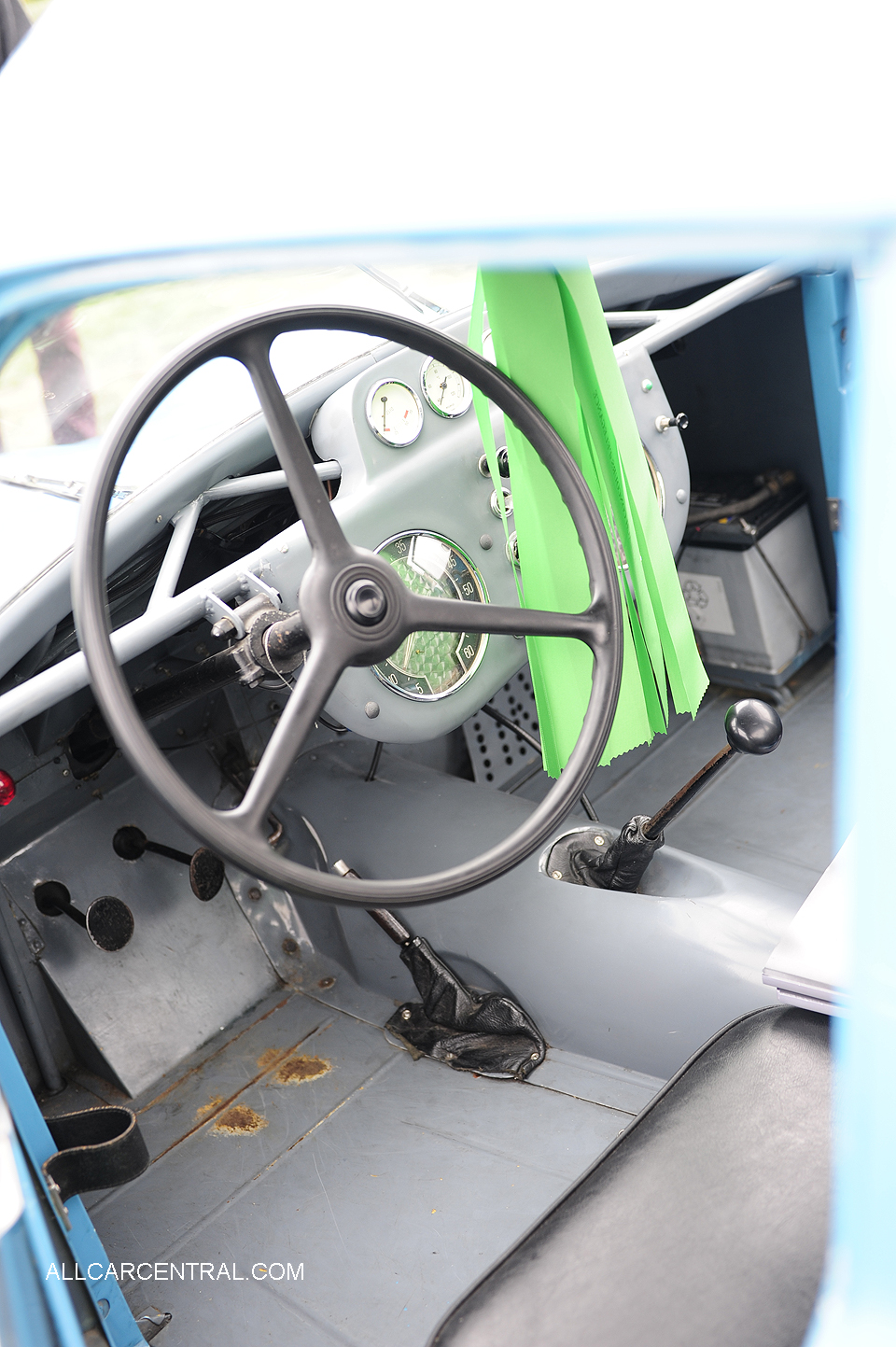
Fiat 500 Bizzarrini Macchinetta Berlinetta 1953 R01 PB 2016

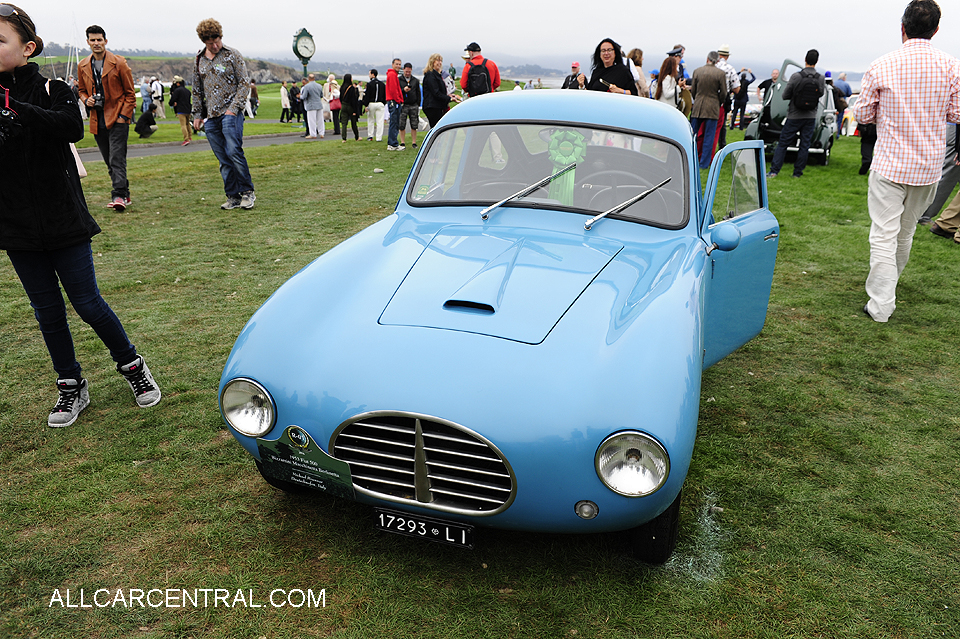
Fiat 500 Bizzarrini Macchinetta Berlinetta 1953 R01 PB 2016

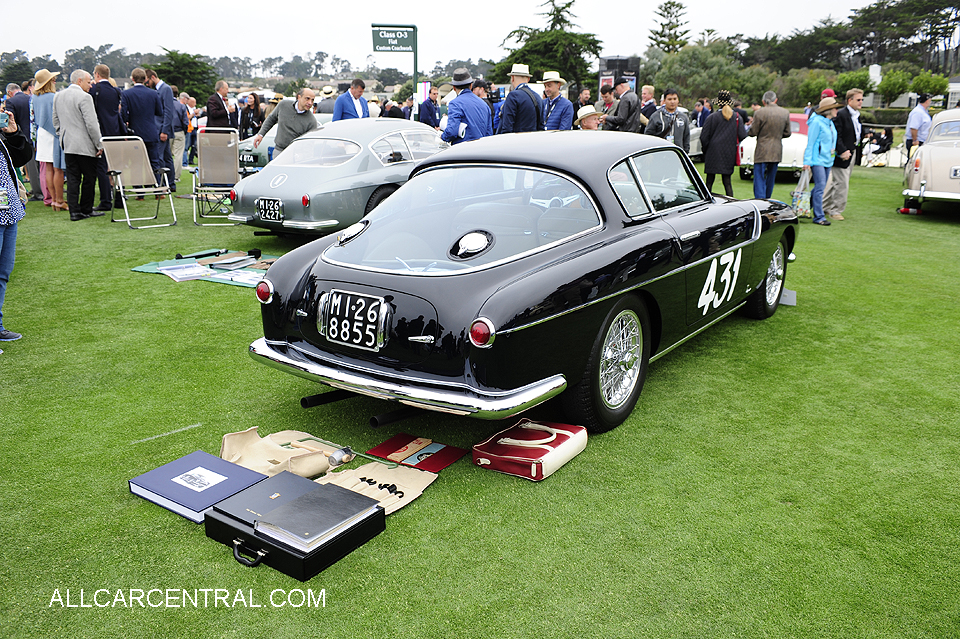
Fiat 8V Vignale Berlinetta
sn-000066 1954
Carrozzeria Vignale built nine Fiat 8V Otto Vus, including this unique
berlinetta (on chassis 000066) designed by Giovanni Michelotti. It was
exhibited at the 1955 Turin Auto Show as the Tipo Mille Miglia ’55 and
was bought off the stand by amateur racing driver Mario Bonacina,
who raced it in the 1955 Mille Miglia. It was exported to the United
States in 1958 and then spent most of its life in California, first with
Shelly Pfeiffer of June Lake and then with Dan Simpson of Glendora.
During its time in June Lake the engine was replaced and the car
sadly deteriorated, but Simpson took on the challenge of finding the
original engine and getting the car back on the road. In 1994 that
reunion finally took place and the car was rebuilt. It was acquired by
its current owner in 2012 and he has restored it.
Source: Pebble Beach Concours media release.

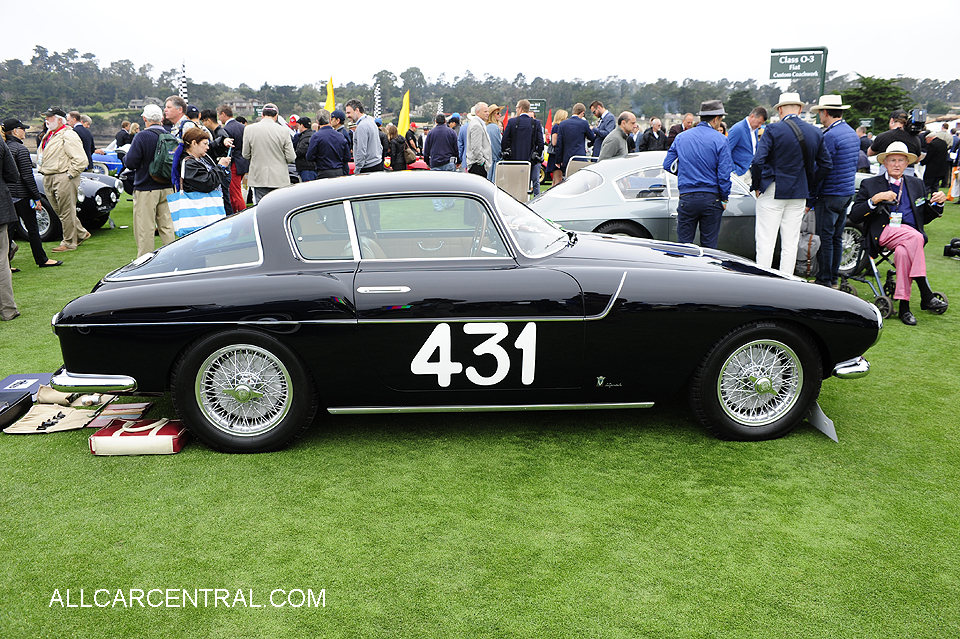
Fiat 8V Vignale Berlinetta sn-000066 1954

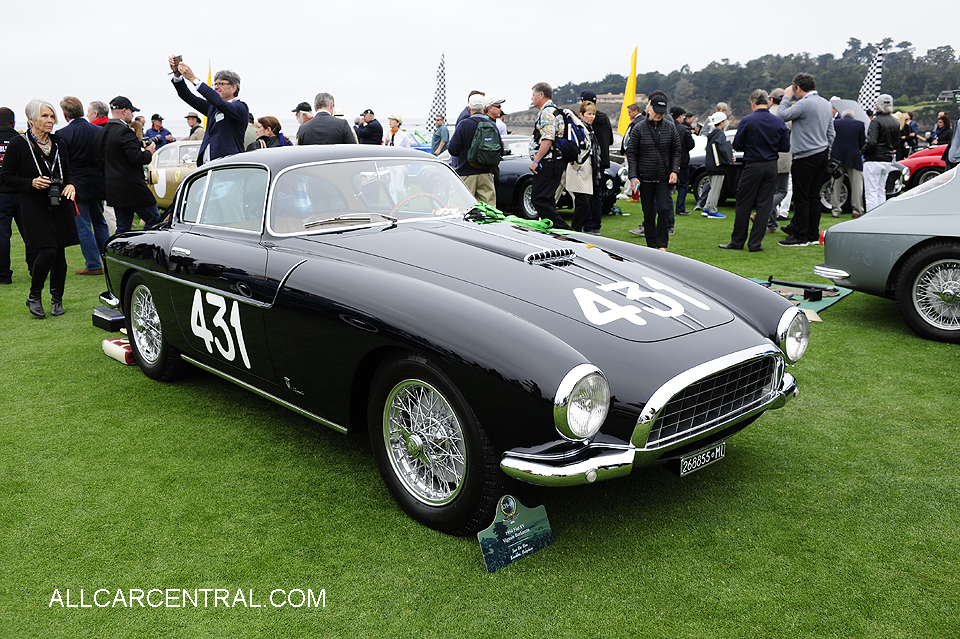
Fiat 8V Vignale Berlinetta sn-000066 1954

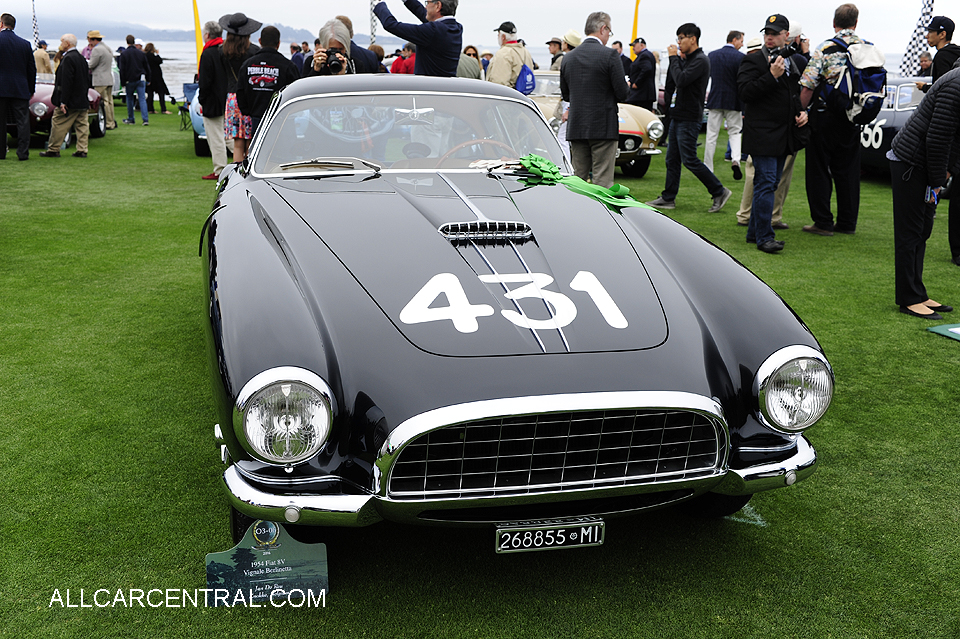
Fiat 8V Vignale Berlinetta sn-000066 1954

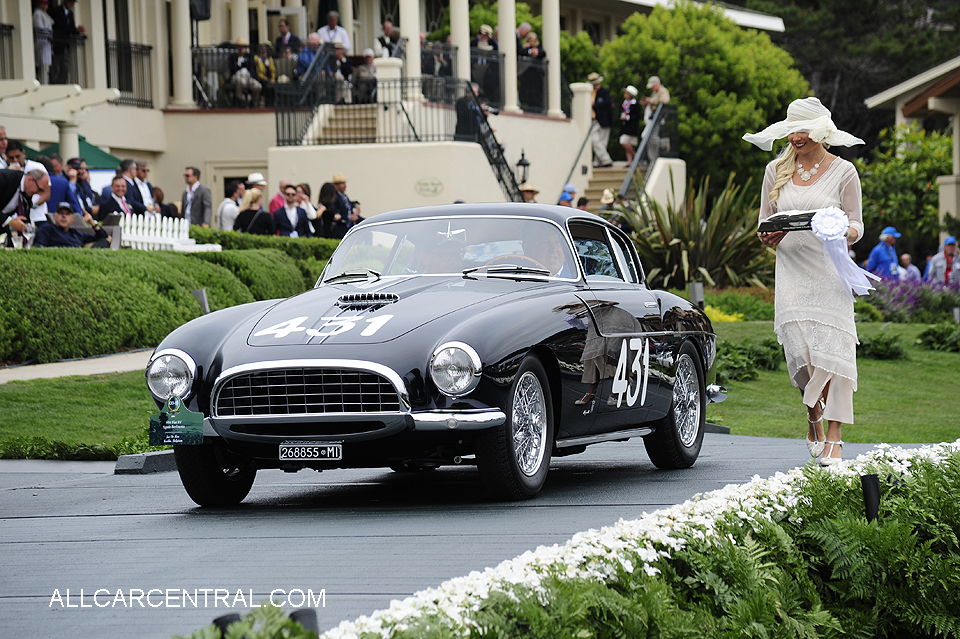
Fiat 8V Vignale Berlinetta sn-000066 1954

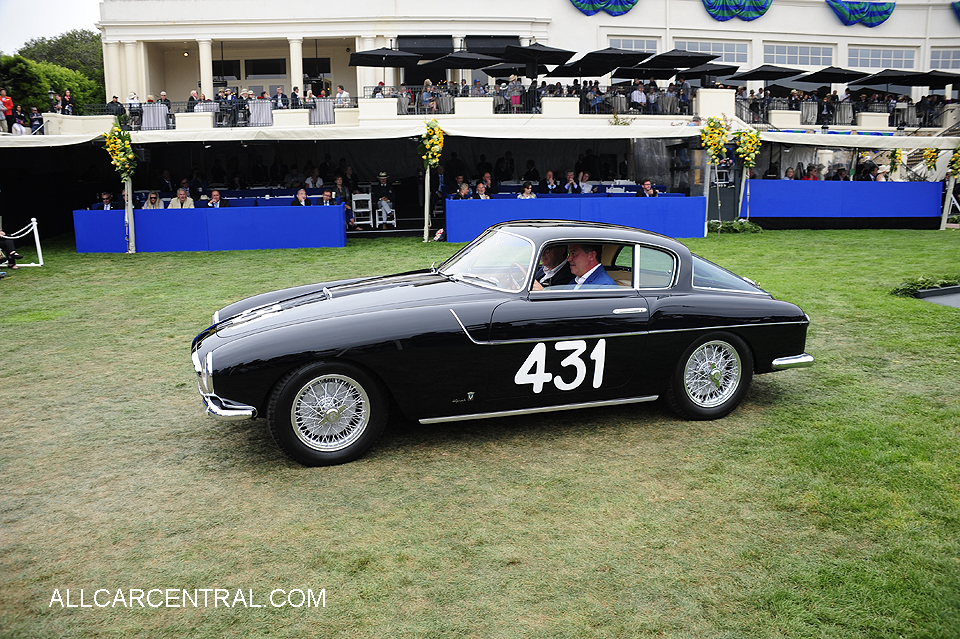
Fiat 8V Vignale Berlinetta sn-000066 1954

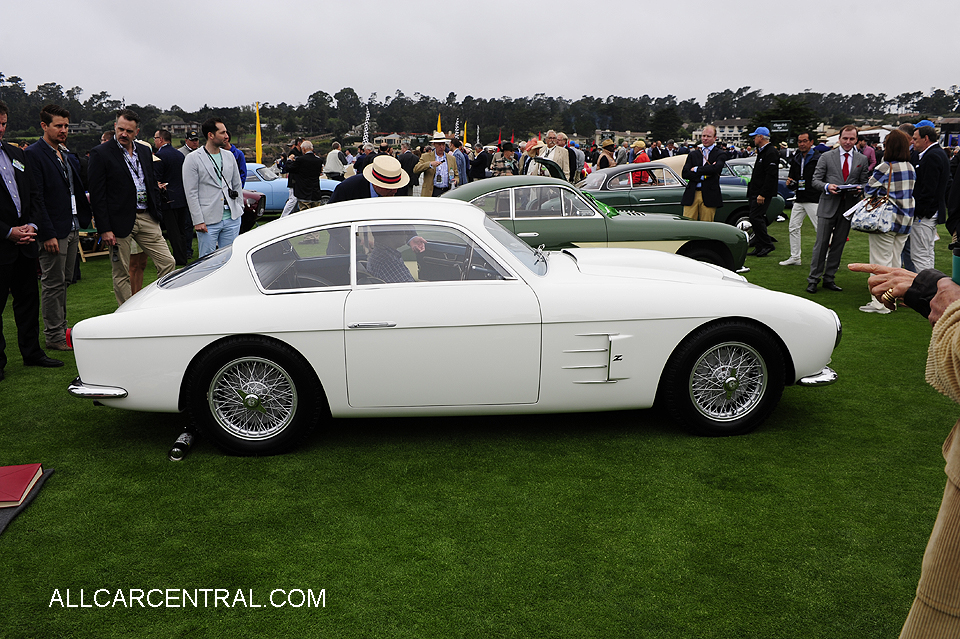
Fiat 8V Zagato Berlinetta
1953
This Fiat 8V Berlinetta left the Zagato production line in May 1953
with a standard body, but the following February 1954 it was
returned to Fiat to be upgraded with twin four-barrel Weber racing
carburetors and matching cylinder heads. After the original owner
passed away, the car was purchased by Esteban Sala Soler, who
sent it back to Zagato to be rebodied in 1956. The new alloy body
included an oversized hood scoop, side vents, curvaceous bumpers,
and Zagato’s signature double bubble roof. In preparation for the
8th RaIlye del Sestrière, the car was sent again to the Fiat Racing
Department, which overhauled the engine and transmission and
added an altimeter, lightweight seats, a new dashboard, and alloy
replacements for many steel components. The car passed through
four more owners before being purchased in 2006 by Strada e Corsa,
which began an exhaustive restoration for Belgian collector Jan de
Reu. The restoration was finished in 2009.
Source: Pebble Beach Concours media release.

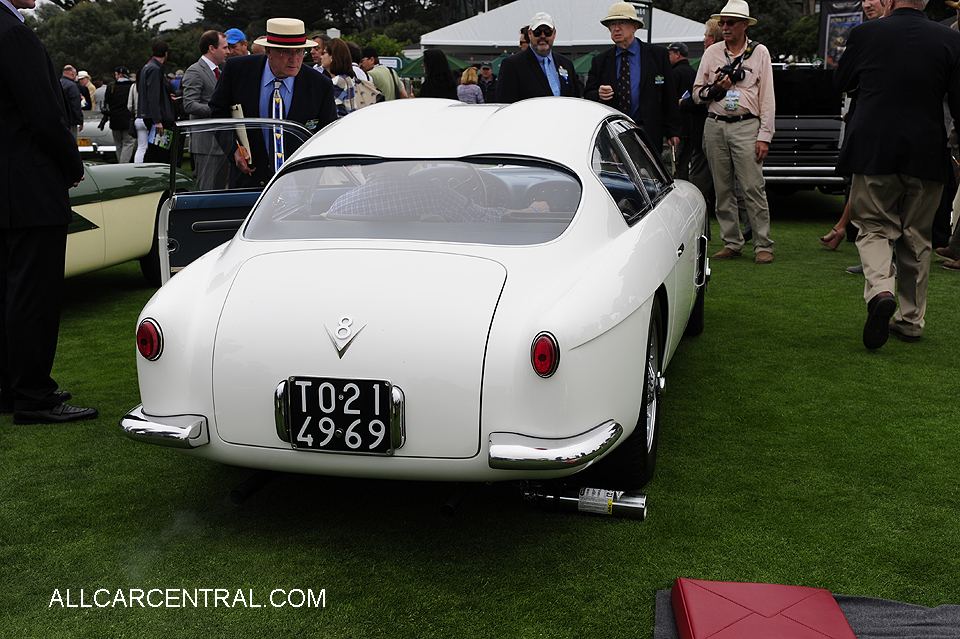
Fiat 8V Zagato Berlinetta 1953

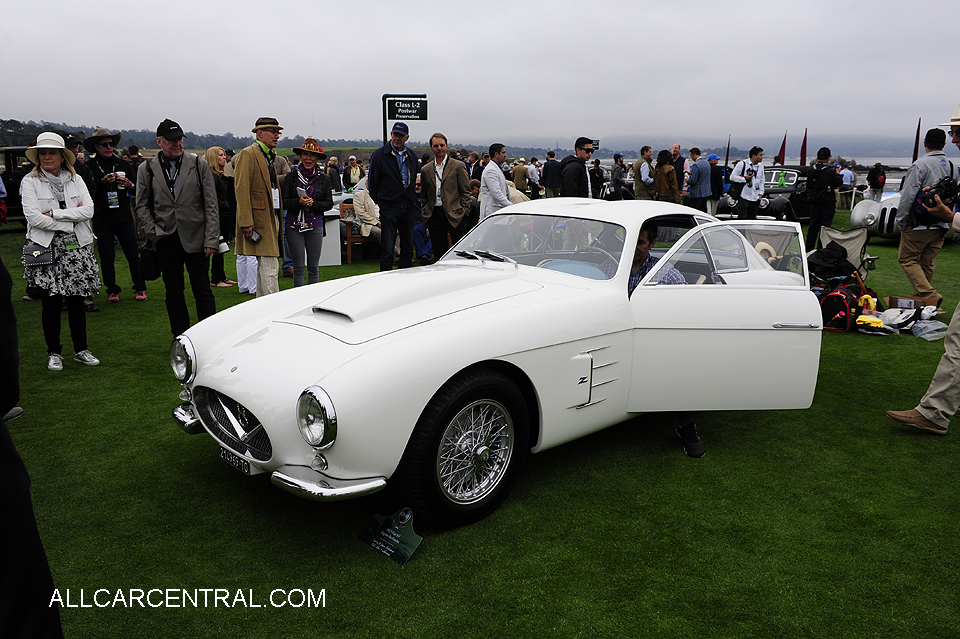
Fiat 8V Zagato Berlinetta 1953

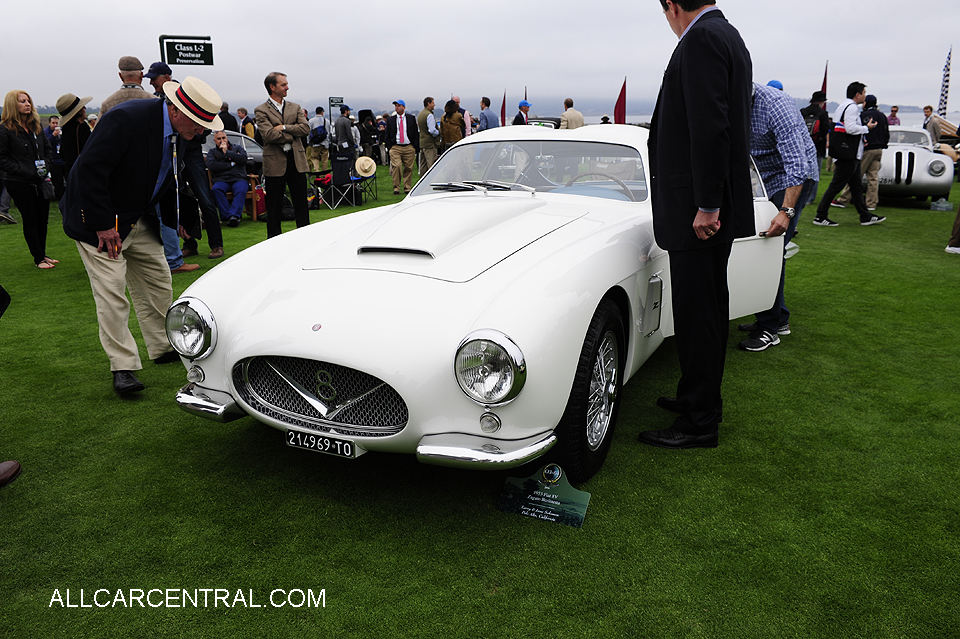
Fiat 8V Zagato Berlinetta 1953

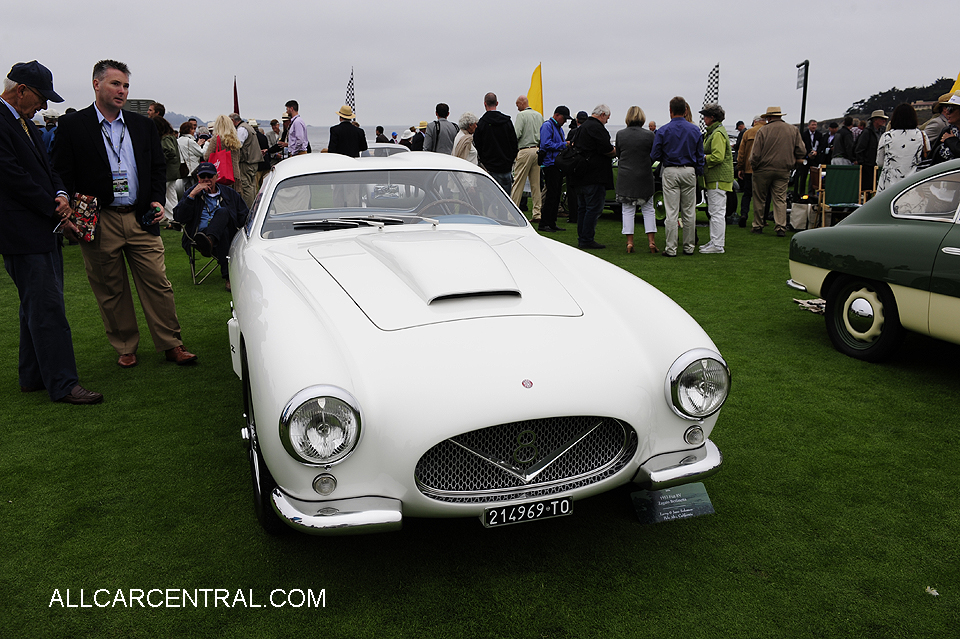
Fiat 8V Zagato Berlinetta 1953

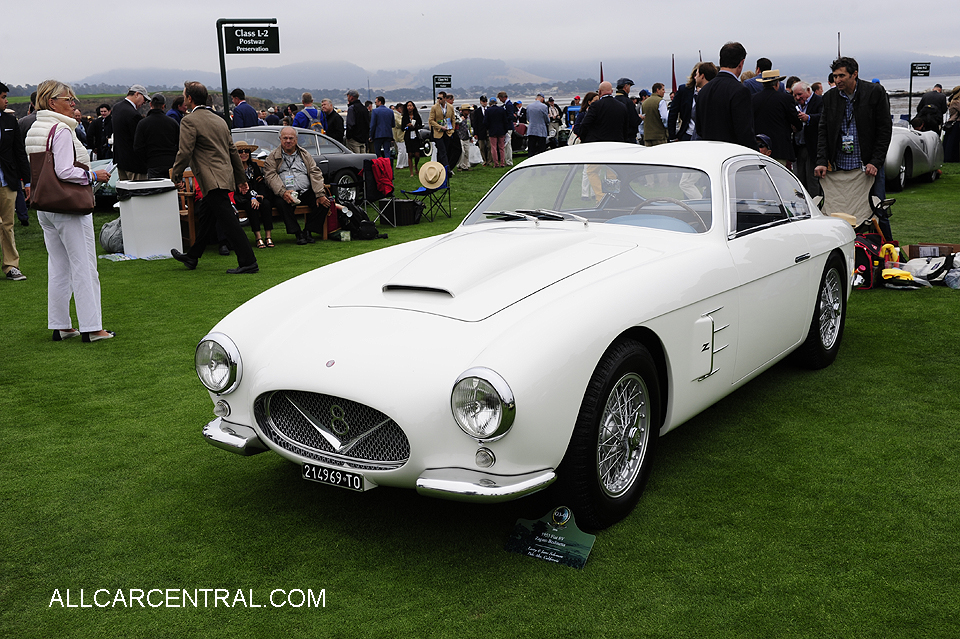
Fiat 8V Zagato Berlinetta 1953

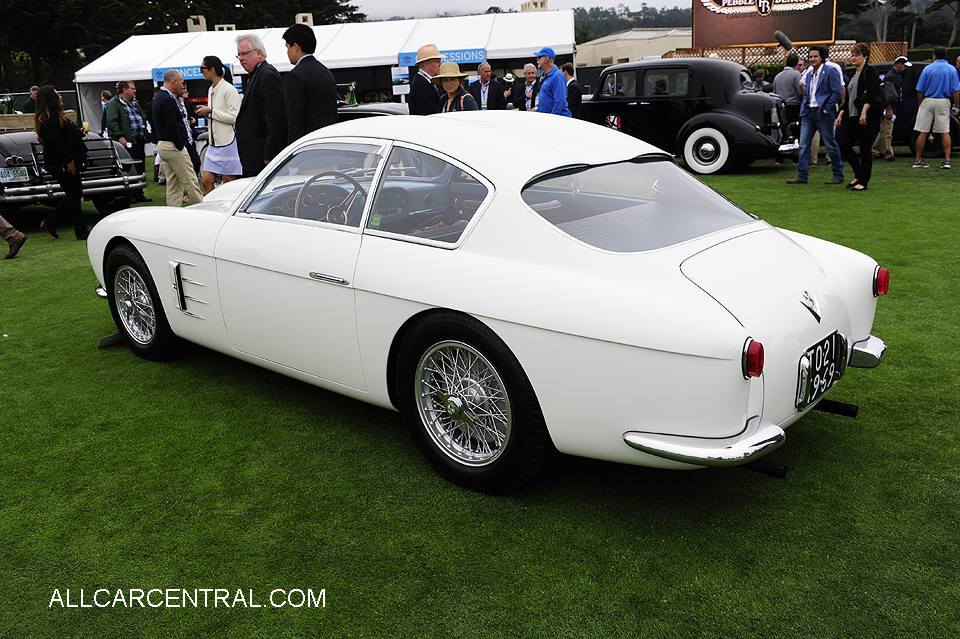
Fiat 8V Zagato Berlinetta 1953

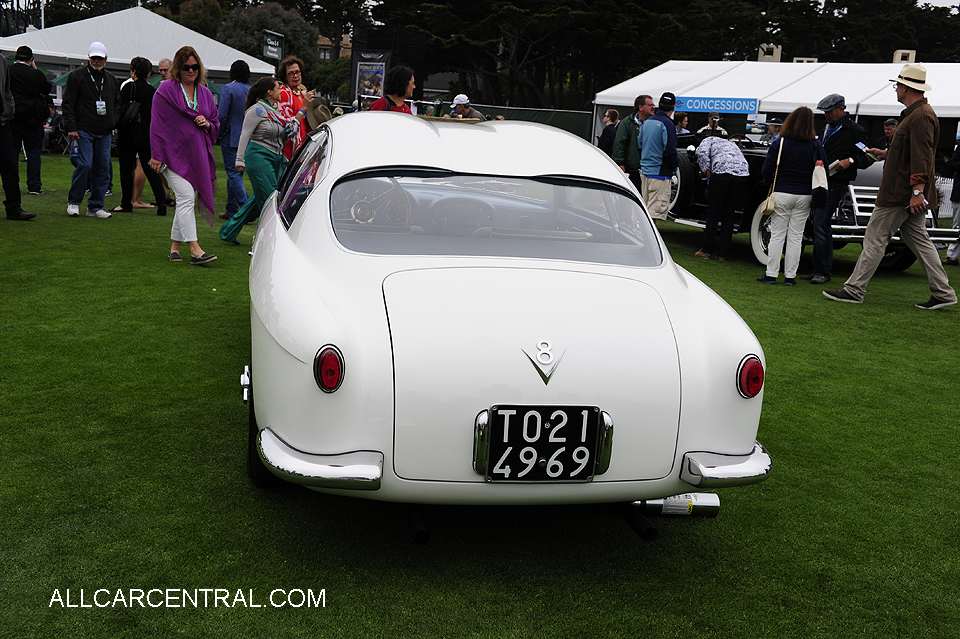
Fiat 8V Zagato Berlinetta 1953

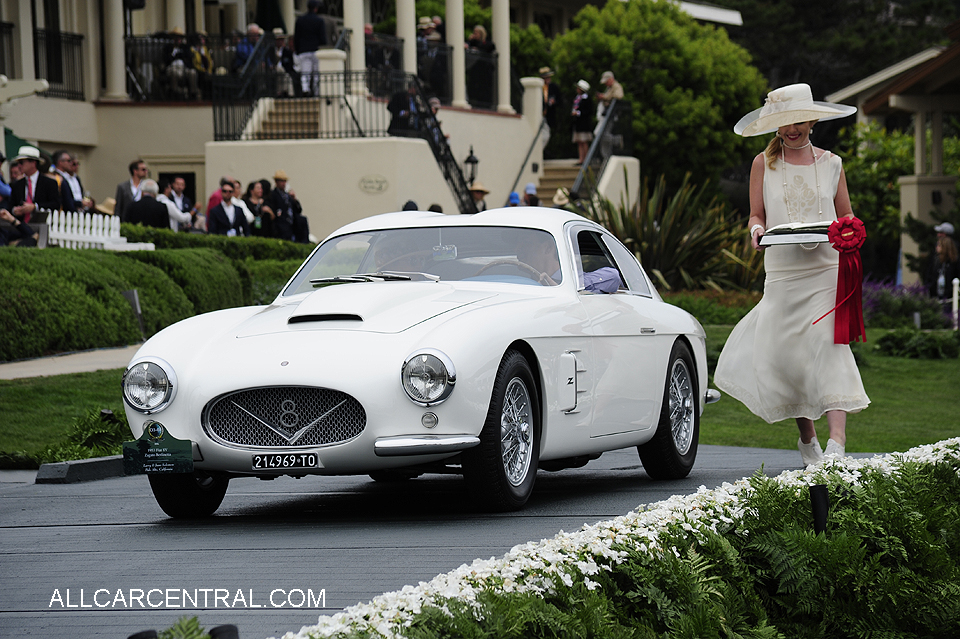
Fiat 8V Zagato Berlinetta 1953

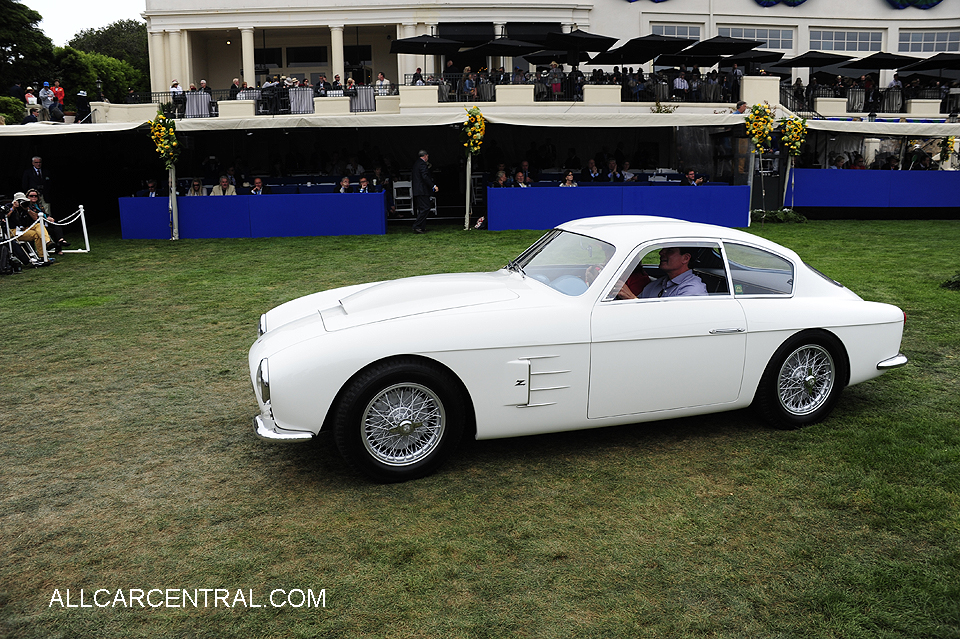
Fiat 8V Zagato Berlinetta 1953

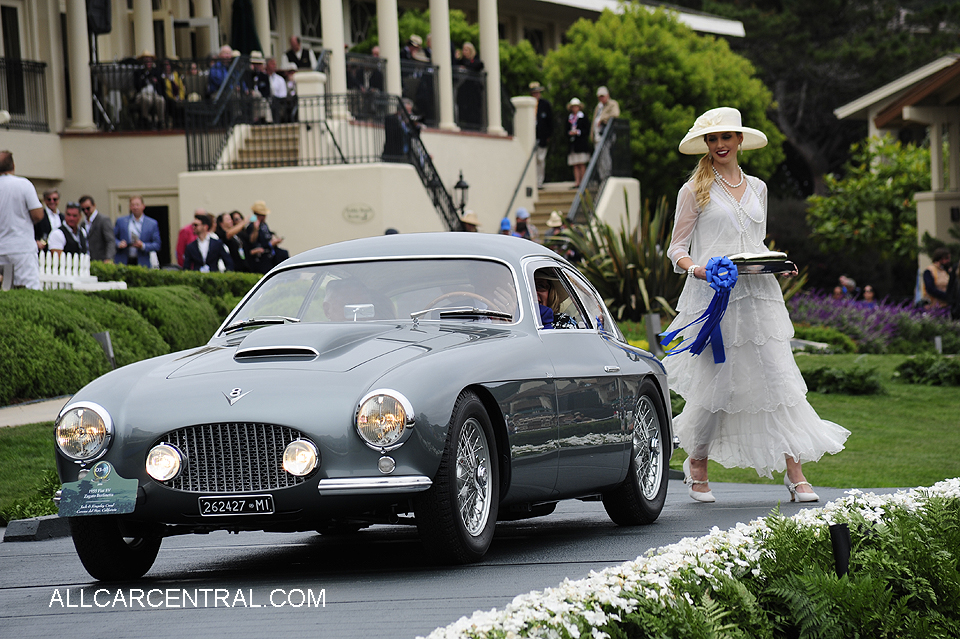
Fiat 8V Zagato Berlinetta
sn-106-000063 1955
The Fiat Tipo 106 Otto Vu was introduced at the Geneva Auto Salon
in March 1952, and just 114 of the 2-liter, 8V-engined cars were
delivered before production stopped in 1954. About 63 Otto Vus
were built with factory bodies and the rest were bodied by other
coachbuilders. Zagato built 30 of these cars, including 6 with its
famous “double bubble” roofline. This car (chassis 106 000063) is
from the first series of production and has several individual features,
including twin wipers, a body side crease between the wheel wells,
no side vents and a slight hump on the air intake on the hood. The
finished car first raced in Italy in 1955, driven by Elio Zagato himself,
and it later took part in three Mille Miglias, winning its class in 1957.
Its current owner bought the car in 1998 and it has been driven in
almost every Mille Miglia Retrospective since then.
Source: Pebble Beach Concours media release.

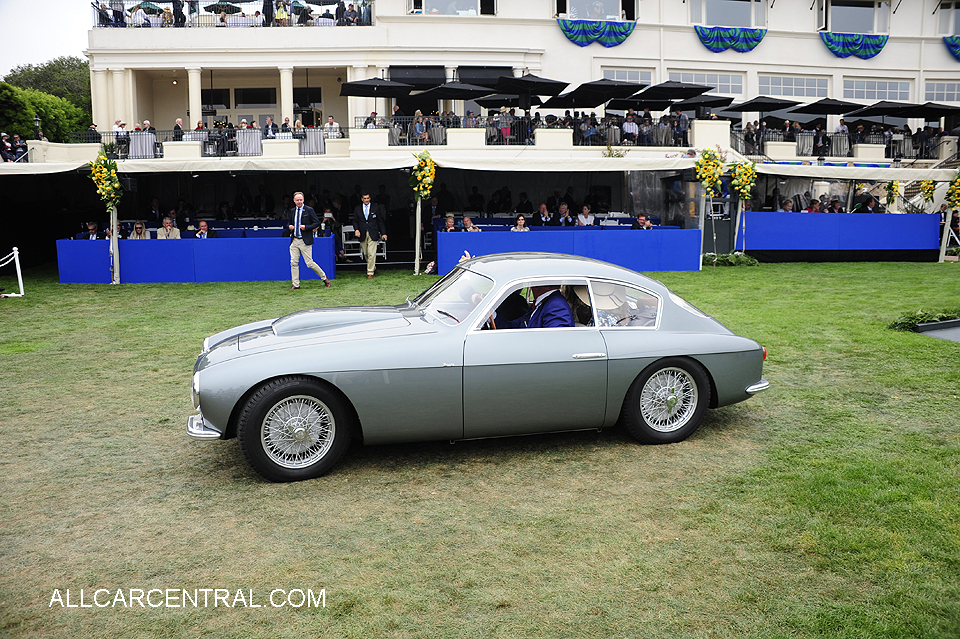
Fiat 8V Zagato Berlinetta sn-106-000063 1955

Ford
GT-109 Roadster 1965
Five Ford GT40 roadsters were built by Ford Advanced Vehicles in
England, and this roadster (GT/109) is one of two steel-bodied
prototypes delivered to Shelby American for testing in March 1965.
This is the only GT40 roadster to have a race history; it ran at Le Mans
in 1965, entered by Ford of France with drivers Maurice Trintignant
and Guy Ligier. As with all the GT40s at Le Mans that year, it retired.
Then it was shipped back to Shelby American, and the roadster
project was shelved because Ford decided to focus its development
on the coupe. After three years of use as a test car for various GT40
modifications, the roadster was spotted in a dusty warehouse by
Dean Jeffries, and he acquired it from Shelby. The roadster remained
with Jeffries until 2013 when its current owner became its custodian.
Source: Pebble Beach Concours media release.

Ford GT-109 Roadster 1965

Ford GT40 sn-M3-1101 Mk III 1967
This GT40 Mk III (M3/1101) is the road-going prototype shown at the
1967 New York Auto Show. The car features the distinctive Mk III front
fender with four headlights and the longer alloy rear end that was
bolted onto the standard Mk I body. To add to its image as a road car,
it was also fitted with a luggage box and Borrani wire wheels. Despite
its road-going specification, the car competed for a number of years
in international historic races. A recent restoration has returned the
car to its New York Auto Show appearance.
Source: Pebble Beach Concours media release.

Ford GT40 sn-M3-1101 Mk III 1967

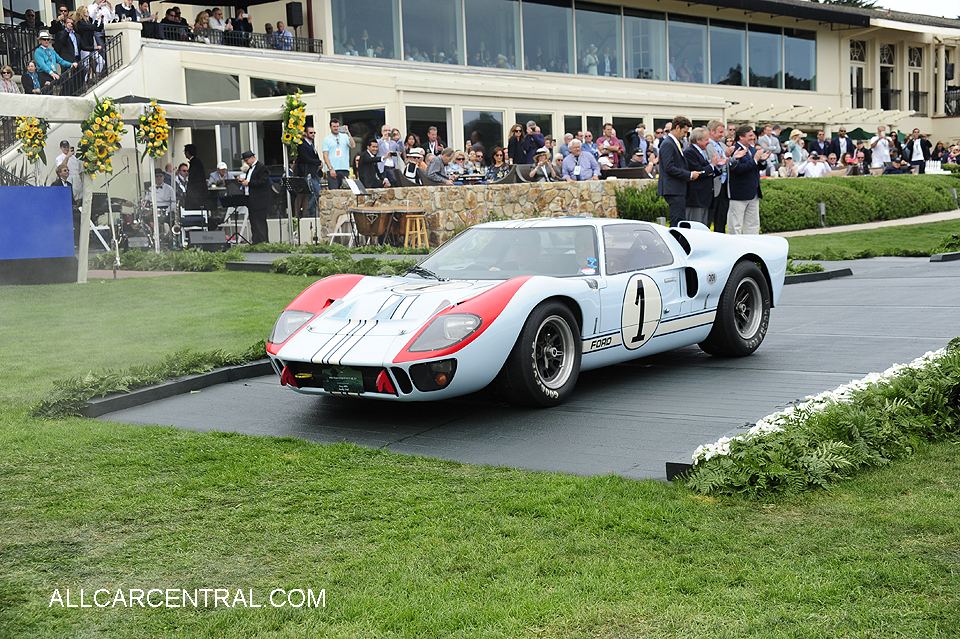
Ford
GT40 sn-P-1015 Mk II 1965
This GT40 Mk II (P/1015) took part in the famed 1-2-3 Ford GT40 finish
at Le Mans in 1966. It made a victorious debut at the first 24-hours
race held at Daytona, in February 1966. Following its magnificent
win there, at the hands of Ken Miles and Lloyd Ruby, the car crossed
the Atlantic to compete in the 24 Hours of Le Mans, where Ken Miles,
then partnered with Denny Hulme, hoped to win the long distance
race. This car led the race through many of the closing laps. Then,
following a Ford decision to stage a photo finish, Miles slowed—
and his GT40 crossed the line alongside the GT40 driven by Bruce
McLaren/Chris Amon and ahead of the GTO of Ronnie Bucknum/
Dick Hutcherson. Officially it finished in 2nd because the GT40 driven
by McLaren and Amon had driven farther at that point, having
started farther back. Following Le Mans, this Mk II was raced again
only twice, once again at Daytona where it did not finish and once
again at Le Mans where it crashed. Then it was retired and put into
storage at Holman & Moody.
Source: Pebble Beach Concours media release.

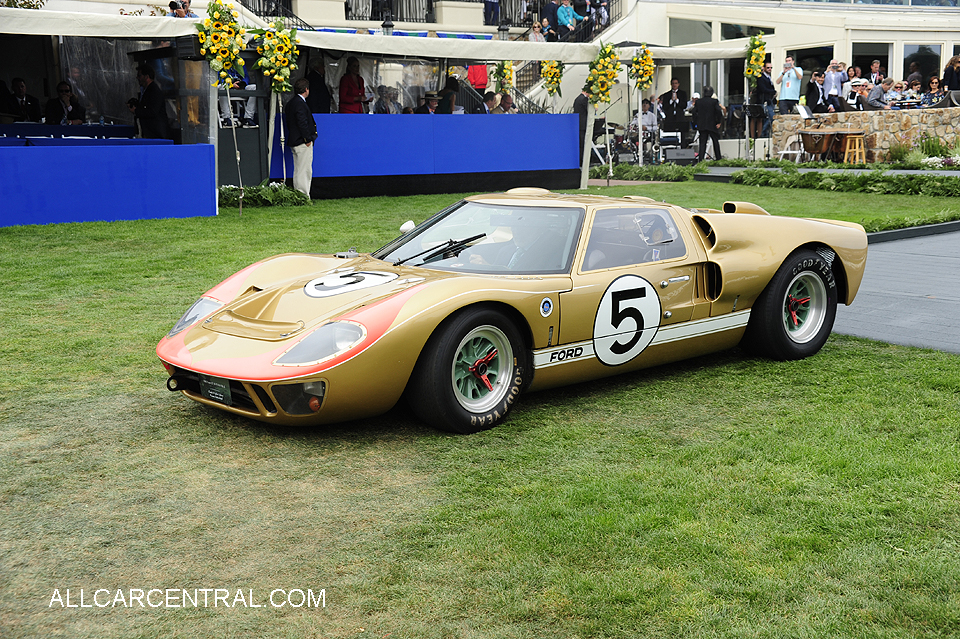
Ford
GT40 sn-P-1016 Mk II 1965
This GT40 Mk II (P/1016) was the third car in the triumvirate of GT40s
that ruled Le Mans in 1966, recording a remarkable 1-2-3 finish.
This car was built in 1965 and shipped as a bare chassis to Shelby
American in Los Angeles, where it was completed in January 1966.
That February, driven by Richie Ginther and Ronnie Bucknum, it
entered its first race, the 24 Hours of Daytona, but did not finish
due to issues with the gearbox. After racing at Sebring in March and
finishing 12th at the hands of A. J. Foyt and Bucknum, it was handed
over to Holman & Moody, who took it to France for the 24 Hours of
Le Mans in June. This proved to be its finest hour: driven by Ronnie
Bucknum and Dick Hutcherson, it finished a close 3rd to the GT40s
that placed 1st and 2nd in a famed photo finish. Its final race was back
at the 24 Hours of Daytona in 1967, driven by Mark Donohue and
Peter Revson, where gearbox issues led to another DNF. In 1970 the
car was donated to the Harrah Museum in Nevada where it resided
for many years.
Source: Pebble Beach Concours media release.

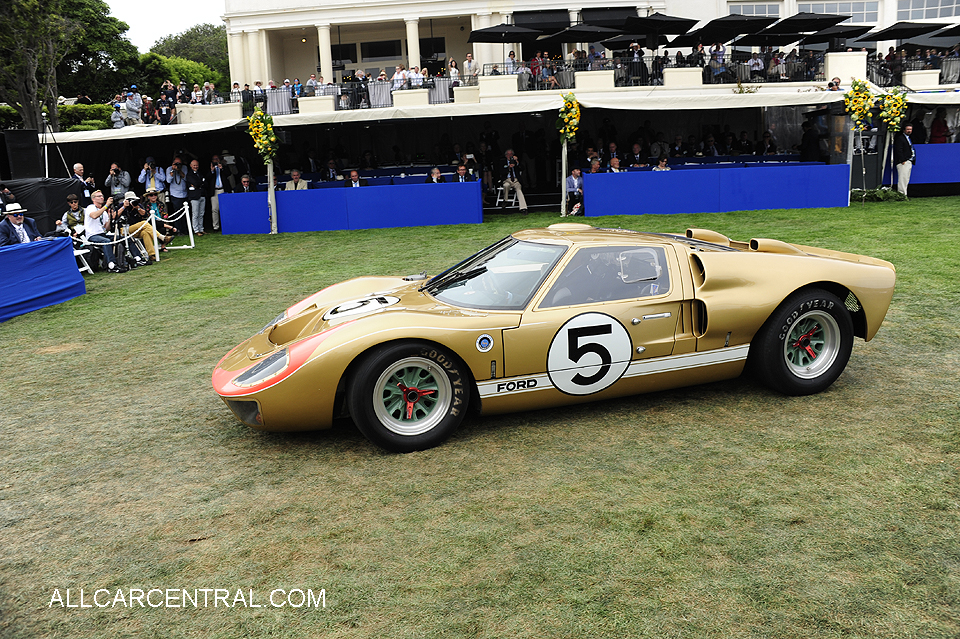
Ford GT40 sn-P-1016 Mk II 1965

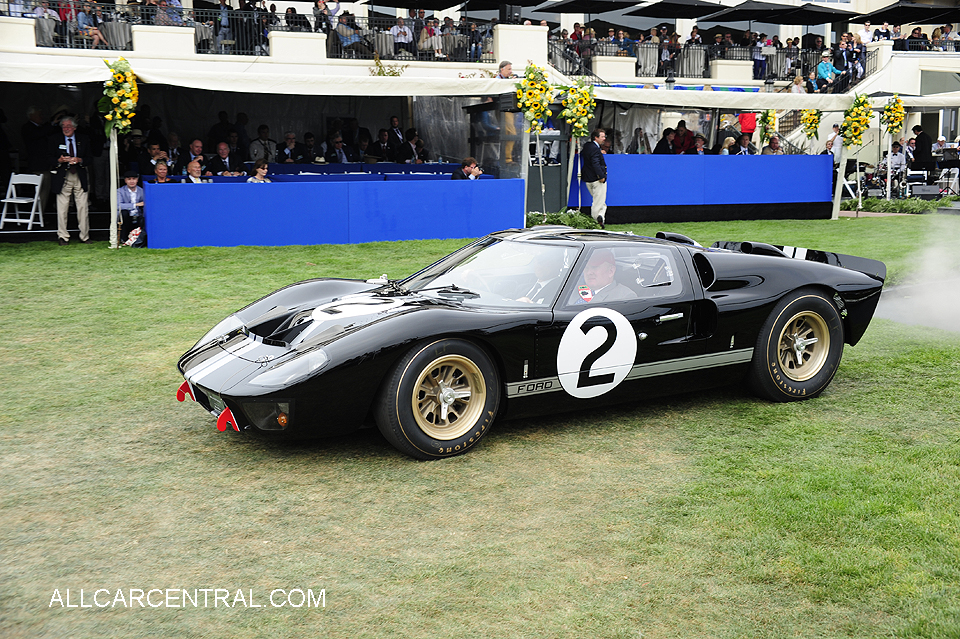
Ford
GT40 sn-P-1046 Mk II 1966
This GT40 Mk II (chassis P/1046), driven by Bruce McLaren and Chris
Amon, placed first at the 24 Hours of Le Mans in 1966, leading
two other GT40s across the line for the famous 1-2-3 photo finish.
Following its memorable win, the car passed to Holman & Moody
and was entered in the 24 Hours of Daytona in 1967, driven by Lloyd
Ruby and Denny Hulme. After running amongst the race leaders,
Ruby crashed on his 300th lap and P/1046’s racing days were over.
Once repaired, this famous car was shipped around the United
States as part of a Ford marketing tour. It was later rebuilt as a roadgoing supercar, complete with a gold metal-flake paint job. Its new
owner has now, thankfully, restored the car to its 1966 Le Man–
winning configuration.
Source: Pebble Beach Concours media release.

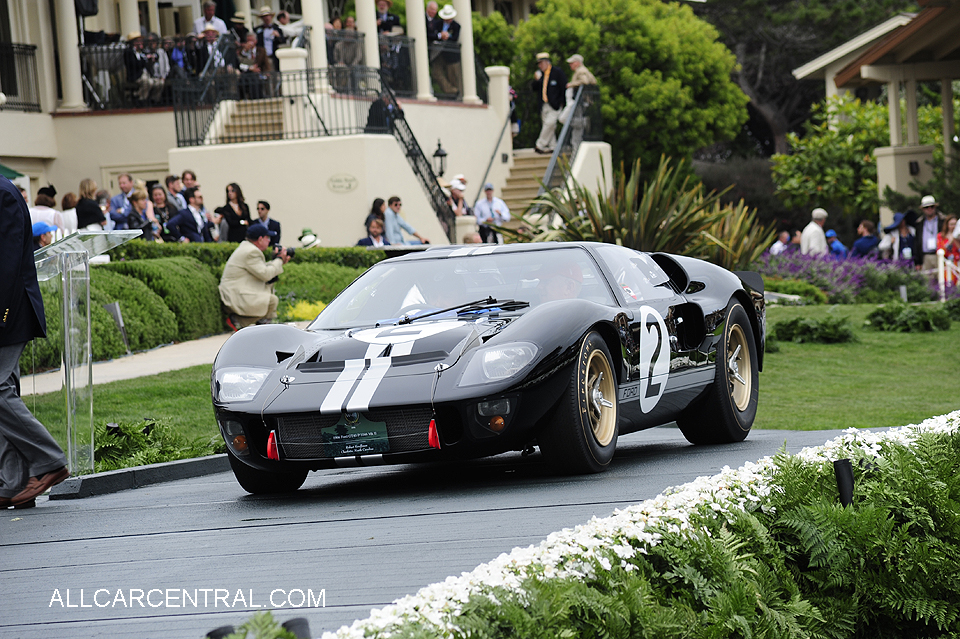
Ford GT40 sn-P-1046 Mk II 1966

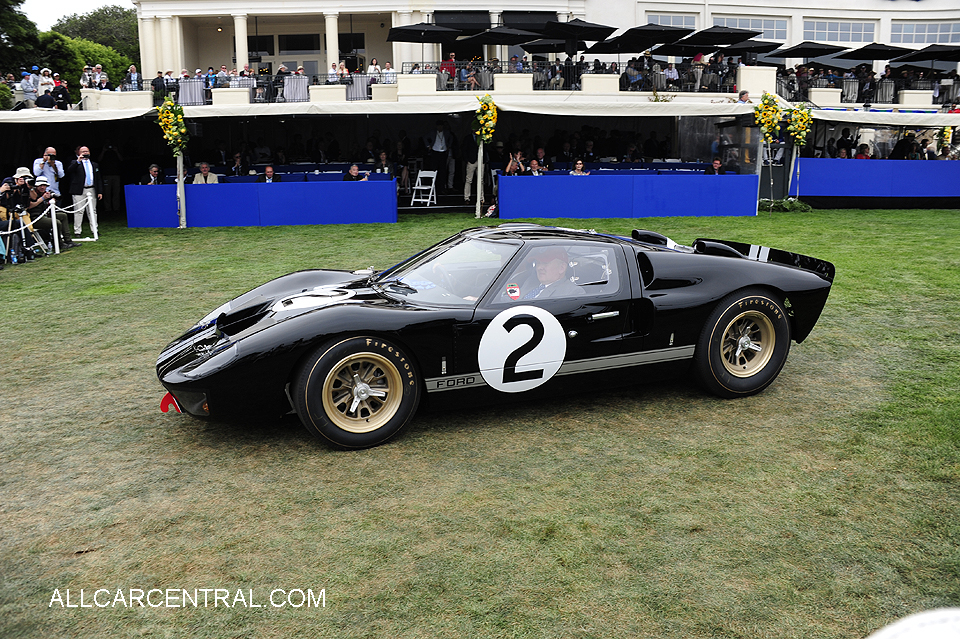
Ford GT40 sn-P-1046 Mk II 1966

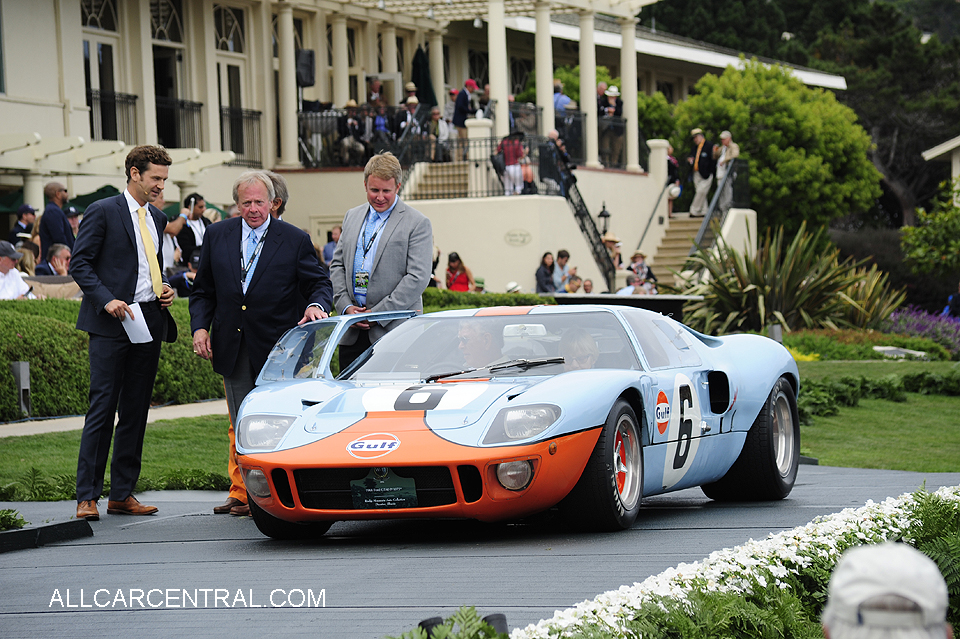
Ford GT40 sn-
P-1075 1968
This Ford GT40 (P/1075) is one of the most important GT40s ever
built, having won the 24 Hours of Le Mans in 1968 and 1969. It is
one of only two race cars in history to record consecutive wins there.
For the 1968 Le Mans race, the regulations were changed and a 3-liter
limit was imposed on all prototypes, eliminating the 427-cubic-inch
Ford engines. Fortunately, the team at J.W. Automotive Engineering,
under the direction of John Wyer, saw the potential of the GT40 as
a Group 4 sports car, and they built two lightweight GT40s with
carbon-fiber reinforced bodywork that was virtually identical to the
original GT40 Mk I. As a result, this car, driven by Pedro Rodriguez
and Lucien Bianchi, scored a resounding win at Le Mans in 1968.
With the GT40 win, Ford was again at the top—and, incredibly, this
GT40 repeated its Le Mans win in 1969 driven by Jacky Ickx and
Jackie Oliver.
Source: Pebble Beach Concours media release.

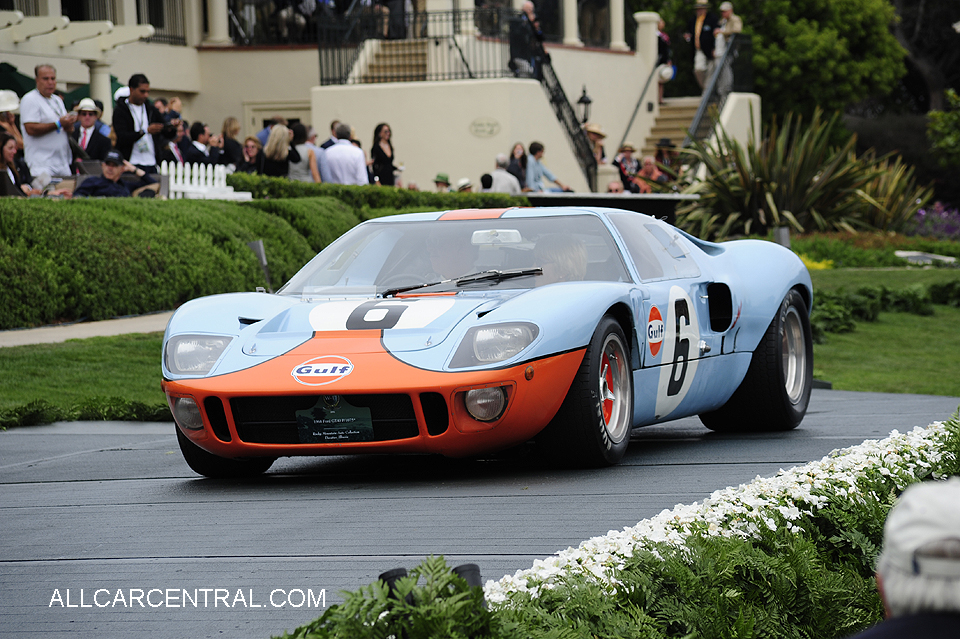
Ford GT40 sn- P-1075 1968

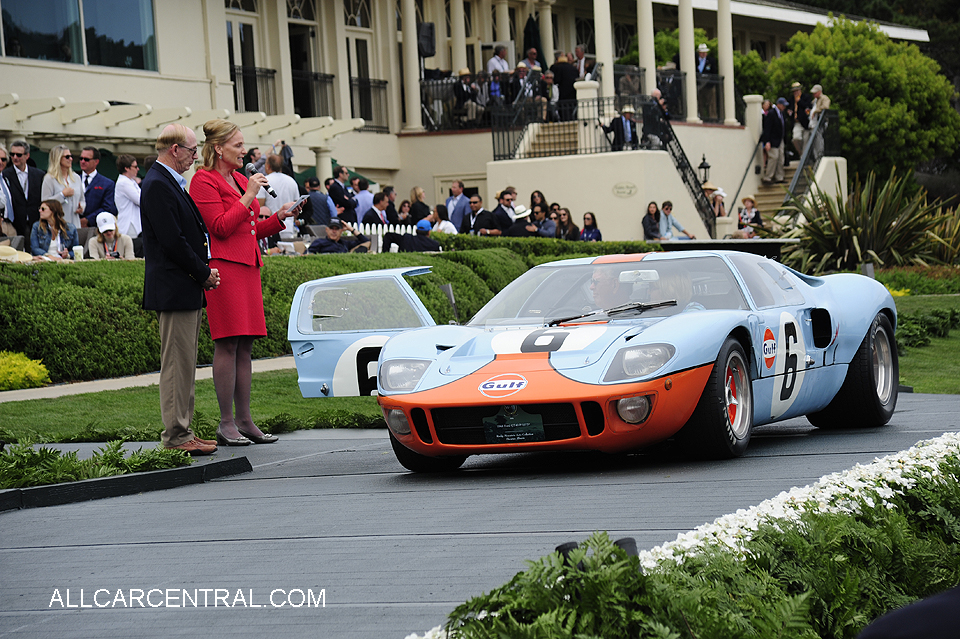
Ford GT40 sn- P-1075 1968

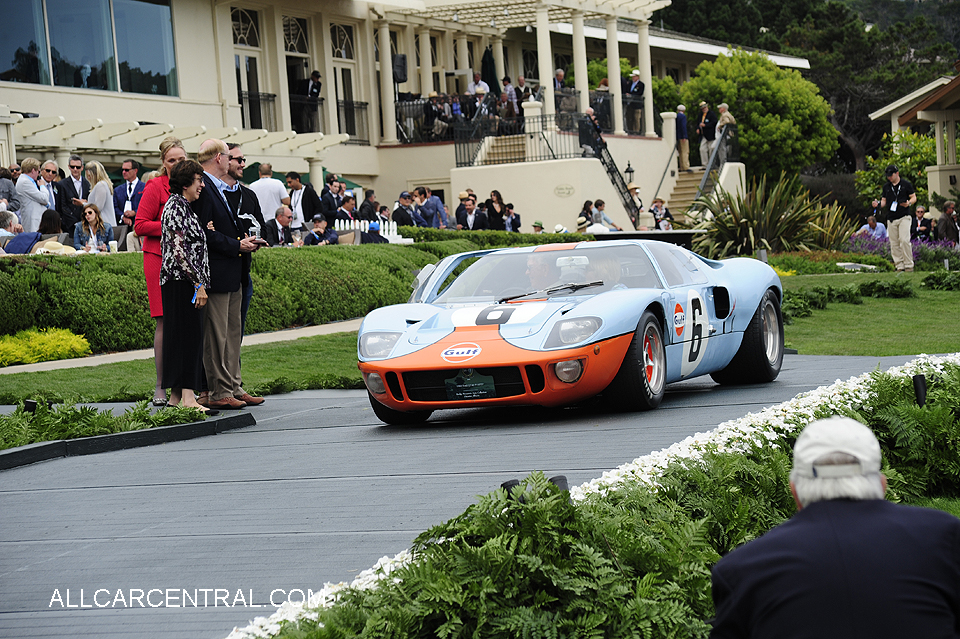
Ford GT40 sn- P-1075 1968

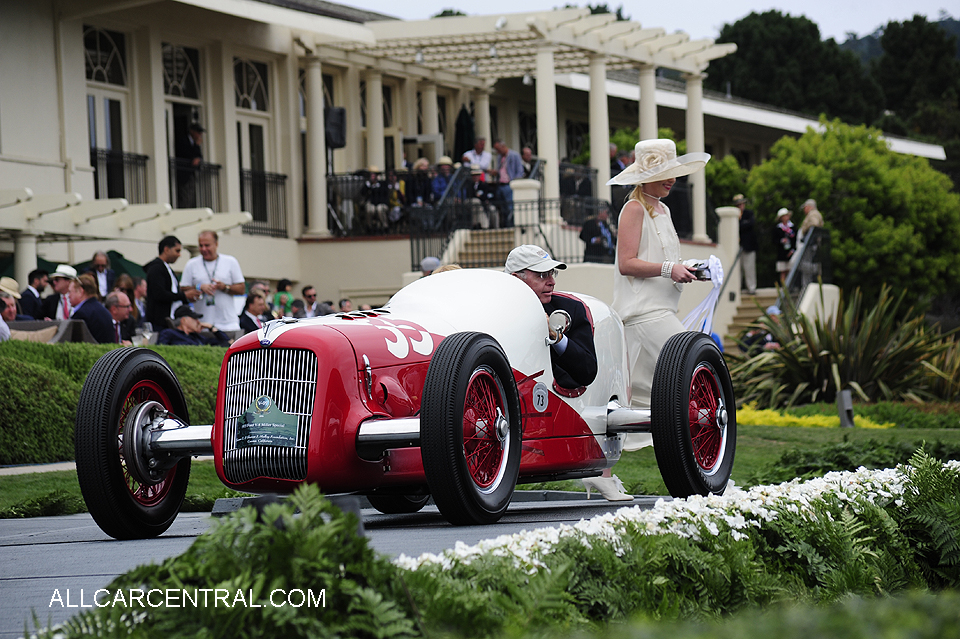
Ford V-8 Miller Special 1935
This streamlined race car is one of the ten created by Harry Miller,
one of the most important American racing engineers of the 1930s
and the creator of the postwar Offenhauser engine that dominated
oval racing between 1935 and 1975. The Miller-Ford chassis
were very advanced for their time, with front-wheel drive and allround independent suspension. This car was driven in the 1935
Indianapolis 500 by George Bailey, who qualified 29th at a speed of
113.432 mph. Three years later, in 1938, the car was entered by Lew
Welch and driven by Herb Ardinger to 6th place, and the following
year Cliff Bergere finished 3rd in the same car. Between 1942 and
1945 the Indy 500 was abandoned, but at the first postwar race in
72
Two-man Indianapolis
V race cars 1930-1937
1946 Danny Kladis brought the car back and finished 23rd. It was
bought by its current owner in 2003.
Source: Pebble Beach Concours media release.

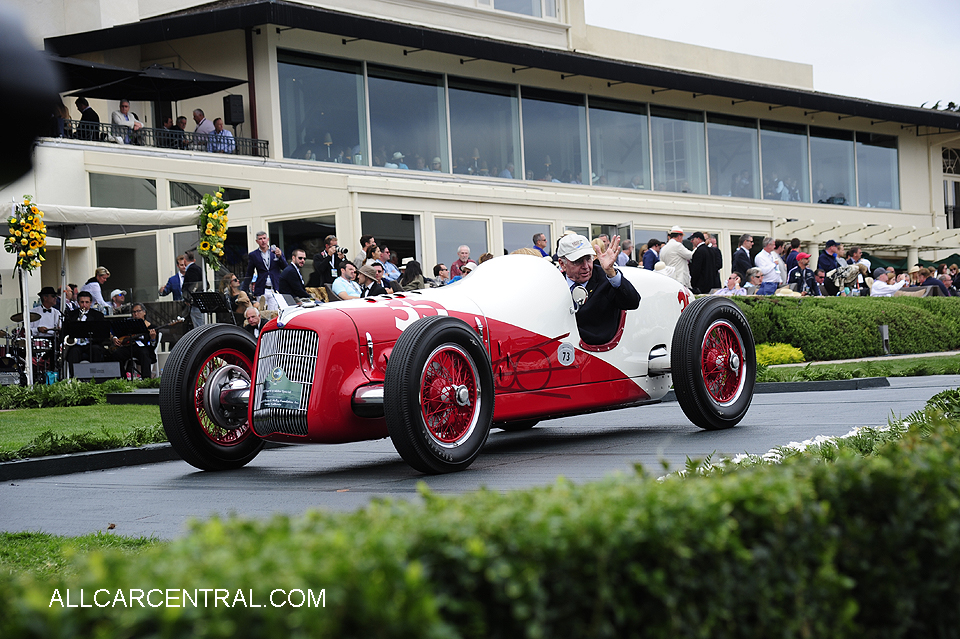
Ford V-8 Miller Special 1935
All Cars • • Racing • • VINTAGE • • Shows • • Gallerys • • Contact
